
These letters were written by Jerome Sears (1833-1864), the son of Hiram Sears (1802-Bef1860) and Sarah Adams (1808-18083) of Lake, Washington county, New York.
Jerome enlisted in Co. I, 93rd New York Infantry, on 25 December 1861. He enlisted as a private and rose in the ranks to Orderly Sergeant of his company before he was wounded in the fighting at Deep Bottom, Virginia, on 15 August 1864. He died on 24 August 1864 at the Satterlee General Hospital in Philadelphia.
Jerome’s younger brother, George W. Sears (1837-1910), is mentioned from time to time in these letters. George served as a private in Co. A, 123rd New York Infantry.
Jerome wrote all of the letters to his good friend and Methodist clergyman John Milton Webster (1828-1914), the son of Orrin Hollister Webster (1800-1862) and Theda Streeter (1802-1872). Webster was married to Chloe Mary Barney (1832-1922) in 1853.

~1~
Albany Barracks
January 25, 1862
Dear Brother Webster,
We are here in Albany yet. It will be at least one week before we leave the barracks. It may be longer. Capt. [William] Randles’ & Capt. [Nathan J.] Johnson’s Companies have been consolidated. There is considerable dissatisfaction in our company. Capt Johnson is our captain, Randles’ is First Lieutenant, Crawford is 2nd [Lieutenant], and [Robert S.] Robertson from North Argyle is Orderly. The non-commissioned officers were appointed yesterday. Some of us have lost the positions we expected to have. I and Robertson from the Lake was appointed corporals, We expected to be sergeants. Our officers will be examined this afternoon. If any are not qualified for the positions, they will be put in the ranks, If any are thrown out, I will have their place.
I am Corporal of the Guard today. There is so much noise in our quarters this morning, it is hard to write. Some are scrubbing the floor, some are playing cards, some are reading the morning papers, a few of the more thoughtful are reading the Bible and other good books. We had preaching here Thursday night by a Methodist preacher from the city. He gave us a chance to talk about Jesus after the sermon. The Lord blessed my soul. He gave me liberty and power. The Lord is with his children here.
My health is good. I think that I can stand a camp life. I hope that you will pray for me. My surroundings are different here. It is hard to find a place to pray in secret. I enjoy my mind very well. I feel the presence of God with me. If you write to me before we leave Albany, address to Jerome Sears, 93rd [New York] Regt., Care of Capt. Johnson.
— Jerome Sears
~2~
Camp Crocker
Washington D. C.
March 18th 1862
Dear Brother in Christ,
We left Camp Bliss the 6th of this month. We were all taken by surprise. We did not expect to leave New York so soon. We took the steamer to South Amboy in New Jersey, a distance of 40 miles. It was dark when we got there. Then we took the cars to the Delaware River. We crossed the river on a steamer. The river is about one mile wide. The City of Philadelphia is on this side of the river. We got to Philadelphia about 12 o’clock at night. A grand supper had been prepared for us by the ladies of that city. After supper that gave all our soldiers a little work called the Soldier’s Prayer Book. After supper we took the cars again. We had to go very slow & keep out of the way of all the trains.
We got to the Susquehanna River at noon. They ran the cars on a large ferry boat and took us across the river to Havre de Grace. We got to Baltimore about 6 P.M. We stayed until midnight. The people of Baltimore did not cheer us any as we passed through the city. They did not like the looks of our Enfield rifles. We got some bacon and bread for supper & was glad to get that for we had been more than twenty-four hours without eating.
We arrived at Washington at daylight. It took us forty hours to go from New York to Washington. We are encamped two miles east of the city. It is a very pleasant place where we are quartered. It is on a hill. We can see camps in every direction. We have one hundred and sixty tents. When we were pitching them, it made me think of camp meeting but instead of prayers & peace, there is cussing and swearing. A large army has left here during the past week. They have gone over the Long Bridge to the other side of the Potomac. Some of them have come back to Washington since Manassas was evacuated.
There was a great stir in our camp on Monday night. Our officers thought they would try the soldiers to see how they would act in case they were ordered to fight. About two o’clock in the morning when all were asleep. except those who were on guard, the drummers began to beat the long roll. The officers ran from tent to tent to try giving the command to march in ten minutes. They began firing pistols through the camp. The sentinels—fifty in number—fired their guns, commencing with number one, so it went all around the camp. The drumming and firing & the officers crying hurry up or we shall be taken prisoners. It caused such an excitement as can better be imagined than described. The most of us got on our equipage in a very short time but some was so excited that they did not know what to do. One or two tried to run the guard. Some began to pray to the Lord to have mercy on them.
The regimental line was formed in a very short time. The Colonel gave the command to march. We went a few rods & the command was given to break ranks & go to our tents.
It is quite warm here. The grass begins to start. The mud is dried up. It is a good time to drill.
My health never was better than it is now. I like the soldier’s life better than ever. The opinion of the people here is that the war will be short. Bro. [Christopher H.] Edgerton is with us but his health is not very good. We need the services of a chaplain very much.
I received your letter the 1st of March. Bro. Webster, you have had a hard [time] on that circuit for the two past years, but I believe that God will bless you in the discharge of your duties. I think it will come out all right. I am anxious to know where you will be sent next.
We have not been paid yet. I think that we will be in a few days. When we do, I will send you some money. I received a letter from Bro. Barber today. He said that Stover told Bro. Newbury to sell the tent & all the accoutrements for what the cloth cost. I suppose he wants it to pay the expenses of warming the church.
From your friend & brother in the Lord, — Jerome
~3~
Headquarters 93rd Regt. NYSV
Camp Bolton, Warwick Court House
April 20, 1862
Dear Brother Webster,
I wrote to you the 3rd of April. I received yours of the 7th. I suppose you had not received my letter when you wrote as you did not speak of it. I was glad to hear from you. I was surprised to hear of the death you spoke of. Brother Edgerton returned on Friday. He told me that he saw you and that the prospect was that you would be sent to Easton. I hope and pray that God will be with you & bless your labors in the salvation of many. I have been almost discouraged for some time past. I see but little desire manifested to do right on the part of the soldiers. I never saw so much wickedness as I have since I have been in the army. There are a few, thank God, that are trying to get to Heaven. Our chaplain does not labor much with us. He has not preached but five or six times to the regiment and held but one prayer meeting since he came among us. Soldiers are dying every few days without Christ and without hope.
Brother Kerr is quite sick at the hospital at Newport News. I miss his very much. He is some of the salt of the earth. There is young man in our company from Hapton by the name of New [and] another by the name of Barber. We left Newport News on the 16th and marched to this camp—a distance of 18 miles. We are quartered near Young’s Mills. This place was left by the rebels a few days ago. The fortifications at this place are very strong. They had good wooden barracks. They will accommodate 12,000. They evacuated the whole concern a few days since and went to Yorktown where they intend to give us battle. There is but one house in this section—a family professing Union sentiments live in it. We keep a guard around the house all the time.
This is a beautiful country—or it was before the war. The rebels burnt their house and barns when they left and then our army has made a clean sweep of everything that is left. There is not a fence left where our army has passed. We are burning good pine rails in our camp today. The ground is all cut up with army wagons. War has made everything look desolate.
I think that we will [see] actual service soon the First & Second Brigades of our Division have gone on towards Yorktown. We will advance in a few days. Our Division is to be placed on the left of McClellan’s great army. Our Brigade is the last in the Division & our regiment is the last in the Brigade. So you see the 93rd comes on the extreme left of the army & this brings us on the right of the enemy. We are within one mile of the rebel pickets. Our pickets and the rebels had a sharp skirmish last night. I heard the firing about one o’clock this morning. The rebel pickets were driven back. Our pickets have not come in yet. I don’t know how many were killed. Some of our pickets are shot almost every night. I consider this picket duty very dangerous and more to be dreaded that the battlefield. I have been on picket several times. I expect to go tomorrow.
I saw the great sea monster called the Merrimack near Newport News. I saw one of the ships that she sunk called the Cumberland. I saw the Monitor. She was lying behind a vessel watching the Merrimack. The Merrimack took three of our vessels the other day near Fortress Monroe.

My health is good now. I have been unwell for some time past but have been on duty with the exception of one day. We have had rather hard times since we left Washington. We don’t have any tents now—I mean the non-commissioned officers & privates. We have got rubber blankets. Two or three put their blankets together and make a shelter of them when it rains. Wr have hard sea crackers and bacon, sometimes coffee, and rice. Some days we have all we want of this kind of food. Some days we don’t have anything. I think the fault is with our quartermaster. His name is Crocker—a brother to our colonel. He has another brother [who is] sutler of our regiment. He charges an enormous price for everything. Of all men that follow the army, I consider the sutlers the meanest. I believe the whole sutler system to be an infamous outrage and ought not to be tolerated anywhere.
I am not tired of being a soldier. I like it as well as I expected. I hope the war will soon be brought to a close but not until it has accomplished that for which it was permitted by God. Direct yours to Fortress Monroe, Va. Write soon. Pray for us. — Jerome Sears
When you write, please direct to Co. I, Regt. NYSV., Casey’s Division. Washington D. C.
Please remember me to Sister Webster, Libbie & Willie. — J. S.
I is my opinion that Crocker and the Major are traitors. We hope to see them soon at Richmond.
~4~
Headquarters 93rd Regt. NYSV
Thirty Miles from Yorktown somewhere in Virginia
March [May] 11, 1862
Dear Brother Webster,
I just received yours of the 5th. I was glad to hear from you and that you have been so successful on your march from Argyle to Ft. Ann. I hope you will be able to hold the fort. I suppose you have heard of the battle that was fought at Williamsburg on the 5th last Sunday. Our regiment was detailed for picket duty. We went out on the picket lines in the morning. We did not see anything of the enemy. At noon we were called in. We were told that the Rebels had left Yorktown the night before. They left several men in their forts. These men kept throwing shells at us all night and the next forenoon. They did this to cover their retreat. These men were taken prisoners and several pieces of artillery.
At 5 o’clock P. M., we got marching orders. We marched nine miles that night. We lay all night out in the open air. It rained hard part of the night. We got very wet and cold. Early in the morning we heard that the rebels had made a stand near Williamsburg. Soon we heard the report of cannons in that direction. we were ordered to move forward as fast. as we could. We started in the rain. Our clothes were all wet through. They kept hurrying us up faster and faster. When we got within one mile of the battleground, another dispatch was sent to us to come on as fast as we possible could for the enemy were driving our men back. Then we took to the double quick. It seemed as if we would drop down before we got there. Some did fall out of the ranks.
When we got there, we threw off our knapsacks, haversacks, canteens, and overcoats, loaded our rifles, and marched forward. We were placed in line of battle along a piece of woods. The rebels were about forty rods in the woods. They were making a desperate effort to get through the woods. Their forts were on the other side of the woods.
As soon as we were drawn up in line of battle, they commenced throwing shells at us. We threw ourselves down flat on the ground. The shells kept bursting over us and on each side of us. We lay under a heavy fire from the enemy’s guns for two hours. Our troops kept coming on. They sent them down in the woods ahead of us and kept us as a reserve for some time.
About sundown we got orders to go down on the advance and face the enemy. We started and got most there when the order was countermanded because it was getting dark. We remained all night in the woods without any shelter or sleep, ready to make an attack in the morning. All the forts on the right had been taken Monday. The one on the extreme left was a very large one. In the morning we heard that they had left during the night. Our cavalry and artillery followed on and overtook them. They killed some and took some prisoners. The rebels left their dead and wounded on the battlefield. More than three hundred uninjured prisoners fell into our hands and more than one thousand wounded. Our soldiers were engaged for two days burying the dead on both sides.
Williamsburg is a very pretty place. It is about two miles long. Most of the inhabitants are left. We are now moving towards Richmond. We are forty miles from there. We expect to have some hard fighting before we get there, We will have to stop marching tomorrow night. We will come to the rebels by that time.
Brother [Christopher H.] Edgerton has gone home. I hope he will do some good there for he was no use to the soldiers here. He did not know anyone but officers. He did not visit the sick any to speak of. I was in the hospital one day. The poor sick soldiers told me that he did not speak to them on the subject of religion. They said that he passed through the hospital once. He got about one hundred dollars for every sermon he read.
I have no more room. From your friend & brother in the army, — Jerome Sears
~5~
Headquarters 93rd Regt. NYSV
White House Landing, Va.
June 20th 1862
Rev. J. M. Webster
Dear Brother,
Your welcome letter came to hand yesterday. I was very glad to hear from you and to learn that that your health is improving. I have been talking with some of the soldiers about trying to get a chaplain. I know it is the wishes of the soldiers generally to have one. I don’t know what the Colonel and the rest of the officers think about it. I think that if the Colonel and officers of the regiment would use their influence, Gov. Morgan would appoint one. Lieutenant Warren got down here yesterday. He will use his influence to get you and so will Barber & all the Arygle boys. I wish you was down here with us.
Bro. Webster, we want to hear the Gospel preached. We have not had any preaching to speak of since we left home. We need a chaplain very much now. A great many are sick. The hospital tent is full all the time. These poor sick fellows want to hear about Jesus. Night before last, I was praying for one that sent for me to come to his tent. He was very sick of a fever. As I arose from my knees, I saw several standing in the door of the tent. One of them said that he had come after me to go to a tent where there were several sick. He said they wanted I should talk and pray with them. I was sent for a few days since to attend a funeral. I was on duty at the White House acting as Sergeant of the Guard at the time. I got excused from duty and went to the camp [and] done the best I could.
I am on duty the most of the [time and] I don’t get much time to read and meditate. I wish I was more engaged in the cause of Christ. I speak of this to let you know how much we need a chaplain. I see one or two difficulties in the way of our getting a chaplain. Our regiment has been detached from the brigade and division. The regiment has been divided—six companies are here as provost guards; the other four companies are at McClellan’s Headquarters near Richmond. They are on the same duty. I will do all I can for you to get the appointment.
Bro. [James] Kerr has got back to the regiment. He has been at Newport near all the time. He was sick five weeks. The rest of the time he worked in the hospital. His company is up on the advance. [Veranus W.] New dried at Yorktown on a steamer. I have been up the Pamunkey River on an expedition. We caught two that belonged to a guerrilla band. the next day twenty more were brought in. They burnt two schooners up the river four miles above us a few nights ago, killed one man on the schooner, then they shot into the cars as they were coming from the advance of our army to the White House. Killed four on the cars. We are not out of danger here at White House.

I suppose you hear all the war news. We had our guard tent full of rebel prisoners night before last. Some of them were good men, I think. they had a prayer meeting in the tent. Some of them got blessed. I believe there is good men in the rebel army.
My health never was better than it is now. Please remember me to Sister Webster and Willie. William Bain, Hawkins, and Barber send respects. Write soon.
— Jerome
~6~
Headquarters 93rd Regt. NYSV
Camp Harrison, Charles City, Va.
July 8th 1862
Dear Bro. Webster,
I just received yours of the 4th and will answer it at once. You see by the date of this that we have changed our position from the Pamunkey to the James River. We were obliged to evacuate White House and do it in a hurry. On the 28th ult. General McClellan sent a telegraph dispatch to our headquarters stating that the right wing of our army had been driven back early in the morning. He ordered us to get out of the way as soon as possible. We had much to do in a very short time. We commenced loading the boat with commissary stores but we did not get much of it on board. We got all the sick and wounded on he boats and some of the tents.
The rebels got possession of the railroad some time in the morning. They destroyed our telegraph and cut off all our communication with the headquarters of our army. We sent out a cavalry picket in the forenoon. Some of them came in at noon and said that the rebels were only six miles of our army [which] was retreating then slowly. About three P. M., the rest of our pickets came in [and] said that the right wing of our army was swinging round to the left. This you will see opened a hole for the enemy to come down the Pamunkey River to White House. At about 4 o’clock P. M., the rebels came in sight. All. the boats had started down the river except three gunboats and three steamers. We set fire to everything that was left—the White House not excepted. We ran a new engine off the bridge in the river, bursted two more, burnt all the cars & 1,000 large tents, several hundred barrels of pork, beef, &c. We shipped about 1,000 contrabands.
About 5 P. M., the remainder of the fleet started, the gunboats in the rear to cover our retreat. We arrived at Fortress Monroe Sunday night and reported to John A. Dix. He ordered us up the James River 125 miles to Harrison’s Point, the birthplace of ex-President Harrison. When we got her we found that the whole of McClellan’s army was here on this point (or what was left of it). I learned from the soldiers that our army had been fighting days and retreating nights. We are here on the point still. The Rebels are all. around except along the James River. If the rebels could get possession of the river, we would all be taken prisoners. I don’t think that they can get it and as the General told us on the 4th, the army is safe.
“I have come to the conclusion from what the soldiers have told me that this great and noble Army of the Potomac has got badly whipped. I am sorry it is so but nevertheless it is true…Our officers try to make us believe that the retreat was designed on the part of McClellan.”
—Jerome Sears, 93rd NY Infantry, 8 July 1862
I have come to the conclusion from what the soldiers have told me that this great and noble Army of the Potomac has got badly whipped. I am sorry it is so but nevertheless it is true. When the fight commenced, the left of our army was within six miles of Richmond. Now we are all driven back 26 miles. I think we have skedaddled this time. I understand that the most of our dead and wounded were left on the field—fell in the hands of the enemy I suppose. I am trying to tell you the truth as far as I know. Our officers try to make us believe that the retreat was designed on the part of McClellan. If our officers knew what I am writing, there would be trouble in the camp. I feel very much disappointed. I thought we would be in Richmond before this.
On our expedition round the Peninsula (or nearly round it), we had a very pleasant time. Our regiment was on board the Knickerbocker. Gen. Casey and staff was with us. William Bain and William Hawkins were taken sick on the boat. Bain started for home yesterday. The Physician says that he will not live to get too Argyle. He has the fever. Hawkins is with me in my tent. I think that he has symptoms of fever. It is very sickly down here. Our soldiers are dying fast. We only report 180 that is able to do duty in our six companies. The other four companies [are] all with General McClellan. We like our new Colonel very much. His name is [Thomas Ford] Morris. He was Lieut. Colonel in the 17th Regt. NYSV.
William Randles is not dead or wounded as reported. I was promoted this morning from 4th Corporal to 3rd Sergeant. My health is good. I never was so fleshy as now. I am on duty all the time. Sometimes we have hard fare. I have got a small tent made of three rubber blankets. The blankets are six feet long [and] three wide. Hawkins and Robertson tent with me.
I’m glad that the President has called for more men. I wish he had called for three times as many as he has. Yet I fear they would not live long down here this hot weather. I am sure if the North would turn out as they ought to, this rebellion would be put down in a short time. I think there is a considerable speculation about this war. The officers don’t seem to want the rebellion put down. I hope that I shall still have an interest in your prayers. I am still trying to serve God. I believe that I love Him with all my heart. I believe that God will save me. If I am called to die, I have not served God as faithful as I wish I had. I will be more faithful in the future by his Grace assisting me.
I don’t know as you can read this. My pen is very poor for I have no table or desk to write on. Give my respects to all enquiring friends. Affectionately yours, — Jerome Sears

~7~
Headquarters Army of Potomac
Camp near Blue Ridge or the entrance of Manassas Gap
November 7, 1862
Dear Brother Webster,
I should have written before but I have been quite unwell. I received your letter in due time and was very glad to hear that your health was improving. I was taken sick when we were at Sharpsburg, Maryland, about the time of the Battle of Antietam. My health is good now. I have marched fifteen miles a day for four days in succession and carried my knapsack the most of the time.
You will see by the heading of this that we are in Virginia again. We left Berlin near Harper’s Ferry last Sunday morning. We have been moving in a southwesterly direction since. We have got as far as we can go at present. We are near the enemy today. Last night I could see their campfires on a hill about four miles distant. There has been some fighting for a few days past. I have not heard much about how the battles went. As we are with McClellan’s Headquarters, we have to keep in the rear of the army. We have got a good position and it suits us just as well as it would to face the enemy. The General likes the 93rd [New York] very much. I think we will stay with the headquarters during the war.
I suppose you know as much about how our army is placed as I do. Gen. Sigel is on the south. Burnside in the center. Porter and Hooker on the north. Heintzelman is about Washington. We have a very large army in Virginia now. I do not see how the rebels can get to Richmond but some think they will. If they do, we are going to follow them right up close and if they make a stand, our army will fight desperately. We are going through to Richmond this time without fail I think.
I was at the 123rd [New York] Regiment near Harpers Ferry. I saw Brother George, John Martin, and many others that I knew. Some of them are very homesick. It is very cold here today. It snows hard. We have no tents now and will not until we get into winter quarters. We make a large fire on the ground and cook our rations. At night we spread a rubber blanket on the ground and roll ourselves up in our woolen blankets and go to sleep. When we get cold, we go to the fire and warm. This is the way the soldiers do. On the whole, it is a hard life but I hope it will not last much longer.
My sheet is full and I must close. Bro. Webster, I do not forget to pray for you, I would like to see you very much. Yours affectionately, — J. Sears
~8~
Warrenton, Virginia
November 10, [1862]
I wrote to you three days ago. We were ordered to march without any notice. I did not have an opportunity of mailing the letter so I will add a little. We marched 20 miles day before yesterday. We are about 40 miles from Alexandria. There has been quite a change of late. Gen. McClellan has been ordered to report at Trenton, New Jersey & Gen. Burnside is in command here now. We were all taken by surprise this morning. Our regiment was reviewed this morning by Gen. McClellan and Burnside. After the review, the General and [his] staff left for Washington.
For my part I am satisfied with the change. Though I think McClellan has done well of late, there is not go ahead enough about him to suit me. I expect Burnside will do something in putting down the rebellion soon. It is reported that we are going to be sent to Texas (I mean the 93rd). We will know in a few days. We have no chaplain yet. I wish you would come down and preach to us. The men are very wicked.
Our regiment is quite large now. We have some new recruits and expect more in a few days. I am trying to serve God but I make but little advancement. The Lord is with me here in the army. I love the Gospel better than ever before. Write soon. Yours affectionately, — Jerome Sears
P. S. Col. Crocker is with us.
~9~
Headquarters Ammunition Train Guard
Camp near Falmouth, Virginia
January 27th 1863
Dear Brother Webster,
I received your kind letter in due time & was glad to hear that you were well. It is all excitement here in the army and has been for several days. Gen. Burnside tried to cross the Rappahannock about a week ago but was providentially hindered by a hard rainstorm. The mud got so deep he could not move the artillery/ The troops have been withdrawn from the river and are putting up winter quarters. Gen. Burnside has resigned. Gen. Joe Hooker has taken command of the Army of the Potomac. I was in hopes that Burnside would get another chance at the Rebs, but there is such a strong feeling against him by many in the army, perhaps it is the best thing he could do under the present existing circumstances.
I think the army is demoralized and will not fight very well. I think that Gen. Hooker is a good general but I don’t think he can do much with the army now. If they had given Gen. Butler or Sigel the command, I think there would be something done to put down the rebellion.
Our company is on detached service now. We are guarding the ammunition train of 1700 wagons loaded with powder and balls. We are three miles from the headquarters. Our duties are rather light. We are having a good time. I think that our regiment will remain at headquarters for awhile yet but there is some talk now of putting us into Berdan’s Sharpshooters. For my part, I am willing to go into anything if we can do anything to put an end to this terrible war. Our regiment numbers about 600 in all. we have several off on recruiting service but they don’t get many recruits.
My health never was better than it is now. I weight 15 lbs. moth than when I left home. Col. Crocker says that he will send me off on recruiting service soon but I cannot put much confidence in his promises. If he does, I shall [let] you [know].
Leroy Bosnard is well. He says that he wrote to you January 3rd. Have you received it? I am still trying to live Godly in Christ Jesus. I do not feel as much engaged in cause of Christ as I ought. Pray much for me. I desire to be all the Lord’s. How much did you get ay your donation at Fort Ann?
Sergt. Robertson & Corp. Hawkins sends respects to you. Please write soon. Remember me to Sister Webster & Willie & all who know me.
— Jerome Sears
Direct to Sergeant J. Sears, Co. I, 93rd New York Vols., Washington D. C.
~10~
Headquarters Army of Potomac
Camp near Falmouth, Va.
March 16 [1863]
Dear Bro. Webster,
I am all alone in my tent today so I thought that I would use the time in writing to my friends. I left home on Friday and arrived here at Falmouth Saturday afternoon March the 7th. I enjoyed my visit home very much and would liked to have stayed longer. George came to see me the day that I got here. He is getting quite smart. I think he will get along with proper care. Bro. Jones of Co. A, 123rd [New York] died a few days since. I don’t know as you know him. He was Class Leader at North Greenwich when he enlisted. Martin Dunlop died about the same time. He belonged to the same regiment, Co. F. He lived near Bro. Morrows. He was a pious young man. George says that there are two deaths a day in the 123rd [New York]. John Martin is well now but has been sick. Leroy Barnard is well. He is on guard today. He sends respects to you all.
My health is usually good with the exception of a cold which I caught the first night that I slept in my tent after I returned. It was good sleighing when I left home. When I got here, it was warm and no snow on the ground. The mud is drying up very fast. I think that our winter campaign is nearly over. We are under marching orders now. I think the army will move in a few days.
All the soldiers in our regiment are anxious to go ahead. We are sick and tired of Virginia. We have been here long enough. I was promoted to 2nd Sergeant while I was home. Sergt. Barber is 1st Sergeant or Orderly. We don’t get along very fast in our regiment. Promotions are slow. 14 months ago Barber was 5th Sergeant and I was a private in the rear rank.
I wish the war was over and the rebellion put down. I desire to be with those who love the Lord Jesus in sincerity. The children of God look good to me. I find but few in the army. M any who once knew what it was to enjoy peace with God when at home are now wicked and are living without God and without hope in the world. How can they stand before the enemy in the day of battle? May the Lord have mercy upon them.
Remember me to Sister Webster & all your family. Please write soon. Yours affectionately, — Jerome
~11~
Headquarters Army Potomac
Camp near Falmouth, Va.
April 6th [1863]
Dear Bro. Webster,
Yours of March 25th came to hand in due time. I was glad to hear from you and to hear that you were all well. It has ben very quiet here in the army of late. There is some excitement today. The President is here at headquarters today and will review the 93rd [New York] tomorrow. The artillerymen are firing salutes now. I received a letter from Bro. Harrower last evening. I will send you a copy of it.
Dear Bro. Sears,
Bro, Webster tells that you told of a case of brother C. H. Edgerton borrowing money off a soldier from Argyle and that the man on his death bed told you that he had never paid nor given a note for it. It is also reported that he drank intemperately with the officers. Will you please write me immediately & let me know the facts about those reports. — P. P. Harrower
The solder from Argyle was John Csary. He told me that Bro. Edgerton borrowed forty dollars from him and said that he would give his one for it, but had gone home without doing so. This conversation took place about the 1st of May as near as I can remember. It was not on his death bed as is reported. I never told anyone that John told me this on his death bed. John died about the 1st of August. I was with him when he died. I could not converse with him on any subject at that time. He was insane for several days before he died. I have just written to the Presiding Elder stating the facts as well as I could. As to Bro. Edgerton’s drinking intemperately with the officers, I don’t know as I ever saw him when I thought he had been drinking but it was reported in camp that he drank whiskey with the officers and many believe it. I thought it best to let you know what the Elder wrote to me. There is a mistake or misunderstanding somewhere. I wish you would write me and let me know what they are doing about it.
My health is good as usual. Leroy is well, He is on guard today. Bro. Jones is dead. I don’t know as you knew him. He was Class Leader at North Greenwich. He enlisted in the 123rd [New York]. I was there a few days ago to see George. He is well. John Martin is poorly. He looks bad but says he is getting some better. I am trying to live for God and Heaven. Pray much for us. Remember me kindly to all your family.
Yours affectionately, — Jerome Sears
~12~
Headquarters Army Potomac
Camp near Falmouth, Va.
May 9th [1863]
Dear Bro. Webster,
I have received two letters from you since I wrote. I ought to have written to you before this. You must excuse me & I will be more prompt in future.
E’er this this reaches you, you no doubt will have heard about the great fight down here in Dixie. I thought you would be anxious to hear how I got along & some others that you know. Our regiment was not in the fight though two companies—I & K—were sent last Saturday night to lay a pontoon bridge across the river opposite Fredericksburg. Just as we got to the river, the Rebs fired a volley of musketry at us from behind the buildings in the city killing one of the 50th New York (we were sent to help them). I thought this was rather a warm reception. Just as they ceased firing, our batteries opened tremendous fire on the town & Gen. Sedgwick who had crossed the river two miles below made an attack on the south end of the city, driving in the rebel pickets and scattering them in all directions. The Rebs soon found that they had enough to do to get out of the way of Sedgwick’s Corps who were marching through the lower end of the town & coming to our help.
We finished the bridge just daylight Sunday morning and went over and marched all through the town. My brother-in-law, a soldier in the 77th New York, was shot through the shoulder. The wound is not mortal. The 123rd [New York] was in the fight upon the right. I heard from my brother George today. He came out all right. 17 were killed and wounded in his company. The regiment was badly cut up. The Rebs took their colors from them & their flag is here at Gen. Sickle’s headquarters now. This is quite a joke on the 123rd & don’t speak very well for the color company. George told one of our officers yesterday that he had been anxious to get into a fight but never wanted to see another.
We can’t get any papers here & we don’t know how the battle has gone. Our army is this side of the river again.
I received a letter from Bro. Harrower yesterday. He wanted me to distribute “Good News” & tracts in our regiment to the soldiers. He is going to have them sent in packages from New York and placed in my charge.
Bro. Webster, I have gained quite a victory of late but not with carnal weapons but through faith in Christ Jesus. I have great peace in believing. I am happy in the Lord today. Affectionately yours, — Jerome Sears
Leroy is well & send respects.
~13~
Headquarters Army of the Potomac
Germantown, Virginia
August 5th 1863
Dear Brother Webster,
I suppose you begin to think that I have forgotten you entirely. I ought to have written before. We have been marching nearly all the time since we left Falmouth in June. You know the route that we have marched by the papers no doubt. We are now near Warrenton Junction. The advance of our forces are near Culpeper. We have been here four days and expect to remain here about a week longer.
My health never was better, if as good. I can endure more hardship than I could last summer. I have not been excused from duty one day since we commenced marching this summer. Bro. Webster, I am growing in grace and in the knowledge of the truth as it is in Jesus I trust. We are holding meetings every evening for exhortation and prayer and will keep them up until we commence marching again. We hold our meetings one hour from seven to eight P. M. Last night a large number were present and the Lord was in our midst and blessed His children and owned our feeble efforts to advance His cause. The officers and soldiers here at headquarters are very wicked. I retired last night at half past nine but could not sleep. I felt a strong desire to be more entirely the Lord’s. I arose, left my tent, went to a beautiful grove near our camp, and there humbled myself before God and wrestled with Him nearly all night. my heart was comforted, thank God, yet I did not receive that powerful baptism of the Holy Spirit that I feel I need. I enjoy more of His spirit this morning than I have in several months past. The reason why I am so weak is because I do not labor in the vineyard of the Lord more. I see now where I did not do right when we first came out. Bro. Edgerton was with us then as our chaplain and of course I expected some encouragement from him, which I am sorry to say I did not receive. He id not do anything in the way of holding meetings to speak of and I allowed my way to be hedged up. I soon lost a measure of the love and zeal that I had in the cause of my master. By the grace of God, I will do my duty in the future. I will pray and exhort sinners to Christ and reprove sin everywhere. I know you will pray for men Bro. Webster. I feel that I need your earnest prayers.
Leroy Barnard is at Gettysburg. He has been there all the time since the battle with six others from our regiment. They were left to guard the Medical train which we left up there. We expect they will be ordered down here soon. Three commissioned officers and six men have gone to Riker’s Island, New York, to bring down conscripts for our regiment. We expect them here soon with four or five hundred men. Then we will do all the duty here at headquarters. What I mean by this [is] we will do the duty that the 8th Regulars is now doing—that is, guarding prisoners and doing provost duty at the provost Marshals general headquarters.
Gen. Meade speaks well of our regiment and says that the 93rd will remain with him as long as he is in command. We like him very much. I think he has done well so far though I think he ought to have fought Lee’s army at Williamsport. If he had done so, I think he would have whipped them to death or compelled Lee to come to time. We think that Meade does not intend to advance much farther until he is reinforce.
Bro. Webster, I would like to see you very much. I hope to some time. If I do not on earth, I will try to meet you in Heaven where all will be peace and love. Remember me to sister Webster, Willie, and all the rest. The men from Hampton that you know are all well. Sergt. Barber sends respects. Please write soon. I will be more prompt in writing in future. Affectionately, — Sergt, J. Sears
~14~
Headquarters Army of the Potomac
Camp at Germantown, Va.
August 18th 1863
Dear Brother Webster,
Yours of the 11th inst. came to hand in due time. I was very glad to hear from you and to learn that you are in comfortable health. Bro. Webster, we have having good times in our camp now. Since I wrote last we have held meetings for prayer and exhortation every night. Sundays we have had preaching by different ministers who belong to the Christian Commission, God has owned and blessed our feeble efforts in a wonderful manner in the salvation of souls. Quite a number are earnestly seeking Jesus today. Two inner company found the Savior today. There are three more in our company who are very near the Kingdom and seeking God with all their hearts. A large number are awakened. A few backsliders have been reclaimed. We are really having a camp meeting down here in Virginia.
Our camp is in a beautiful grove. The Lord has blessed me abundantly and I am working with all my might for the salvation of the men. Oh! I thank God for the privilege of exhorting sinners to acceptance. My soul at times seems to be all on fire. The Christian Commission has done us much good. They furnish us with good reading matter and preach the Gospel occasionally. Quite a number are Methodist preachers that have visited us.
August 20th
The good work is going on gloriously. A great work has been done in our company already and many are now praying the prayer of the Publican. Six in our company have testified to the power of the Gospel to save. Some of them are out in a clear light, a few have been converted in other companies. The enemy of all good is by no means quiet. It seems as if the Devil was in some of the officers and men. Yesterday he tried to counteract every good impression that was being made. A large number of officers and men got drunk on whiskey and today a ten quart pailful of whiskey was brought into our company. But the Lord Jesus Christ is with us and through Him we do conquer. Glory be too God with whom He can thresh a mountain. We are more than a match for all our enemies. One can chase a thousand who goes forth armed with the Spirit’s might.
I will give some of the names of those who have been blessed. Corp. Wm. Hawkins—my tent mate, Sergt. [Samuel K.] Huggins from Argyle, Sergt. [Archibald] Robertson from Lakeville (not very close), Private James Morehouse from Johnsburgh, Private Albert Wait from Shushan. All these in our company. Bro. Webster, pray that we may have a sweeping time in the 93rd. Write soon. Yours affectionately, — Sergt. J. Sears
~15~
Headquarters Army of the Potomac
Camp at Germantown, Va.
September 11th 1863
Dear Bro. Webster,
I have been looking for a letter from you in answer to my last, but I suppose you are at camp meeting these days and will write when convenient. My object in writing today is to try to persuade you to leave your charge and family and come down here a week or two or more. You can come as member of the Christian Commission. Your expenses will be paid and you will have all necessary papers as soon as you join the Commission. Bro. Webster, we want to see you down here. The Hampton boys says tell Milton to come without fail.
I do not wish to over persuade you, but you will find everything quite comfortable here now. The Christian Commission tent is a good one. It is near our regiment. There are two preachers here now–Brother Bent, a Methodist preacher from Massachusetts, [and a] Brother Clark, a Baptist preacher from Boston is here now. I have just been talking with Bro. Bent about writing to you. He says tell bro. Webster to come down and help us if he can. You will find the address in this written in pencil mark. Bro. Bent gave it to me.
We are having good times here now. The Lord is carrying on His own work in His own way. We have meetings every day and evening and in every meeting some are converted or redeemed. We don’t have much preaching. Someone exhorts about twenty minutes every night. The rest of the time is given to the soldiers to pray and talk. Our meetings are getting very powerful. Every minute of the time is used. I have tried to tell the story of the cross twice within the past week. The first time a large crowd were present. Four preachers were there. They troubled me some. I want more grace to preach christ before ministers and generals. I am growing some, thank God. The Lord is leading me in a way that I knew not.
Bro. Webster, think it all over. Write if you think of coming to Philadelphia and you will get all necessary information. Please write to me as soon as you get this. Bro. Webster, we will take good care of you if you come. Leroy is well. He has taken a good stand in this revival. He is a real worker.
Yours affectionately, — Sgt. Jerome Sears
P. S. I wish you would send me Whedon’s Commentaries in the Gospels. I don’t know whether it is in one volume or more. I want them anyways. If you will send them, I will send the money to you as soon as I receive them. Send them by mail and state the amount you have today. — J. S.
~16~
Headquarters Army of the Potomac
Camp near Brandy Station
November 14, [1863]
Dear Bro. Webster,
I am glad that I have one more chance to write to you. I would have written before but I have had no opportunity of doing so until now. I received your last letter in due time. Was sorry that you could not come down to Dixie awhile but as it is, it is all for the best perhaps, for we have been on the go nearly all the time. We marched north a day or two and then south again. I tell you, Bro. Webster, it is rather discouraging work. We are now within six miles of Culpeper, just where we were a month ago. We have been as far north as Fairfax Court House. The Rebs gave us a lively turn on our retreat north, but we out-generated them or out marched them got possession of the heights of Centreville and Bull Run. Now the Rebs are on the other side of the Rapidan and we are all as near the river as ew can be with safety. We will have to remain here about a week or ten days until the railroad is repaired from Warrenton Junction to Culpeper. We are hard up for rations and can’t get any until the road is done. By that time, we think the fall rains will hinder us from going much farther. Some think the Rapidan will be the line this winter.
I am glad to learn that my native state went all right at the late election and that Gov. Seymour is forced by public opinion to take a better stand. I pray God that the Spirit that would nominate such men as Gov. Seymour and Vallandigham to high offices may be blotted out. Religion, I am sorry to say, is at a low ebb in our regiment now. Many that were converted have gone back into the ways of sin. As soon as we get into winter quarters we would like to have you come down and help us. We intend by the help of God to gain a large victory over the devil and take back all the souls that he has taken from us and persuade many more to leave his service and enlist under the bloodstained banner of the cross.
Yours respectfully, — Sergt. J. Sears
~17~
Headquarters Army of the Potomac
Camp near Brandy Station, Virginia
February 20 [1864]
Rev. J. M. Webster
Dear Brother,
We are in Virginia again as you will see by the date of this. I reported at Albany the 1st of February. The Colonel ordered me to the barracks on duty Tuesday. I got permission to go home and return Thursday morning. Saturday we left for the Army of the Potomac and arrived here the 10th. We are doing duty at headquarters as before, I felt disappointed in being sent down here so soon, but perhaps it is all for the best. We left a recruiting party up there. Sergeant [William B.] Barber was left and Capt. [Nathan J.] Johnson from our company. I am doing Orderly’s duty now. I would liked it much better to have stayed up there on recruiting service and let Barber come down here and do his own duty.
Bro. Munsey was down to Albany nearly a week trying to get the appointment as chaplain to our regiment. [James M.] Crawford was on hand too. The officers took a vote upon it and Crawford got one vote the most and got the appointment. I would rather give a hundred dollars than to had it turn out in that way. The men all wanted Munsey but we could have nothing to do in voting. I like Bro. Munsey very much. I worked as hard as I could for him. The majority of the officers don’t like Methodist preaching. They don’t like to hear anything about Salvation by faith or denying self. Crawford is waiting up there for his commission. We expect him down here soon. I hope he may get converted before he comes to the army.
It has been very cold for a few days past. How much did you get at your donation? Are you holding meetings yet?
I have no news to tell you of much importance. Twenty-nine guerrillas from Mosby’s command just came into our headquarters. They were taken near here last night. I saw Leroy today. He is well and is well pleased with his situation in the Signal Corps. Remember me to all enquiring friends.
Please write soon. Yours affectionately, — Jerome Sears
~18~
Headquarters 93rd NYS Vet. Volunteers
Near Brandy Station, Virginia
May 3rd 1864
Dear Bro. Webster,
I wrote to you about the 20th of March if I remember right. I thought you would write to me as soon as you could after Conference but as we are to move very soon, and I may not have a chance to write in a long time, I will write again notwithstanding I have not heard from you. I suppose you have heard ere this that we have been assigned to the 2nd Corps. We are in the 2nd Brigade, 3rd Division. Gen. Hancock commands our Corps. General Birney the Division. Gen. Hays the Brigade. I like our position well so far. We have been here about ten days. Before you get this, I think we will be on the move somewhere. We don’t know where. Grant don’t let us know all that is going on. We can’t go far south before we will have to fight unless the enemy fall back. We are within ten miles of the rebel force.
We are all in good spirits but we expect to have to fight very soon. One of our new recruits cut his thumb off this morning. It looks to me as if he was working to get out of the service.
Since I wrote last the Lord has done a great work in the 93rd Regt. About four weeks ago, Bro. Kerr and me built a place for prayer. We met there once a day to pray for the outpouring of God’s Spirit in our regiment. In the evening we held meetings in our artillery camp near our regiment. God done a great work in the batteries there. Many were saved from their sins. God began to work in the 93rd in reclaiming backsliders. It was not long before we had eight or ten to meet with us. We kept on praying for the salvation of souls.
We left headquarters and that stopped the meetings in the batteries. After we got here, we commenced holding our meetings out in the open air about a hundred rods from our camp. The work is going on increasing in interest and power. Sinners are saved in every meeting. Our number has increased to twenty-five and it seems to me as if half of the soldiers in this command are awakened.
God is working in His own way. The work is thorough and deep. Our chaplain is standing still and seeing the salvation and this is about all we know of him. I think he is a good man, but he has no faculty of working in a revival. He baptized some yesterday who desired baptism. He does not try to discourage us in the good work. He seems to be well pleased with the course we have taken.
I heard that you were sent to Beecher though I have not seen the minutes of the Conference. Please send them. I am quite anxious to hear from you before we march for it will be a long time before we get any mail after we leave here. I think there will be hard fighting down here this spring. Many in our regiment may be killed. I may be one of them. It will be all right any way—I am the Lord’s, entirely His.
Bro. Webster, try to come down sometime the summer when we are not marching. Remember me to all your family and pray for me. I saw Leroy two days ago. He is well. Yours affectionately, — Jerome Sears
~19~
On the battlefield
June 1st 1864
Dear Bro. Webster,
I have only time to write a few lines. I received yours of the 4th on the 15th/ Also your last of the 20th yesterday. There is so much that I want to tell you I hardly know where to begin. In the first place, I want to say to the praise of God that my life has been spared through the terrible battles that I have been in. I have been in seven engagements—some of them lasting all day. the first was on the 5th of May. My company[lost] 17 in killed and wounded. the morning of the 6th the fight was commenced at daybreak, lasted all day. I was hit very slightly on my finger. About noon we were ordered to fall back a little. While turning around, a bullet struck my knapsack and lodged in one of my shirts. It came very near going through my knapsack.
The next day we were being driven back some and trying to rally our line. I with two others rushed out ahead of our line of battle about 15 paces [while] our men were firing. One of them shot very near my head—so near that it hit my ear but did not injure me any. It taught me a good lesson.
On the 12th our Corps made a charge on the enemy’s works at 4:30 o’clock A. M. It was a terrible time. We took 7,000 prisoners and 28 guns. After we had taken the guns, a few of us turned a large brass piece on the enemy. We had plenty of their solid shot and shell & we were using it to good advantage. They soon got a gun to bear on us. A shell burst in the air over my head. A piece of it struck me on the left hip. I was not bad hurt at the time [but] I could not get off the field without help. I soon found that I was not seriously wounded—it was only a bruise. My commanding officer told me to go to the hospital a few days. I did not feel as if I could leave what was left in my company so I came back on the field the next morning. I have been some lame ever since but have been in every fight & have done my duty ever since.
Our company went into the first fight with 48 men. Now we have only twelve left and only 9 [fit] for duty. Our 1st Lieutenant who commanded the company was killed on May 6th. Jay H. Northup, our 2nd Lieut., has been I command since. Sergt. [William] Barber was shot through the ankle on the 23rd. He came to the regiment on the 20th. It was the first fight he was in. Sergt. [William] Hawkins was shot through the leg on the 5th of May. His leg was amputated. Sergt. [Robert S.] Robertson in the foot. He is doing well. Corp. [Jabez B.] Eldridge killed. Corporal [John] Orcutt wounded in the hand. Private Henry Orcutt killed. Private Murray killed. Private Balcom killed. We have lost only 5 killed that we know of. The rest are wounded and missing. We numbered 560 in the first fight in our regiment. Now we have only 150.
We are now on the Peninsula about 12 miles from Richmond but [illegible] every day. I don’t know how long the state of things will last. I can’t write any more now. Stuart Wilson wounded. Junius Clark wounded. Col. Crocker is as brave as a lion. He had command of the Brigade a few days. He [illegible] now. Major [Samuel] McConihe is in command. I want to say a word about our Lieut. Jay H. Northup. He is a noble young man & the bravest of the brave. He lives in Hartford, New York.
Excuse this awful writing. My love to you all. — Sergt. J. Sears
P. S. Direct as before. Write often. If you go to Argyle, call and see Sergt. Hawkins & Capt. Randles. — J. S.
~20~
On the battlefield near Petersburg, Virginia
July 6th 1864
Dear Brother Webster,
Yours of July 1st came to hand this morning. My health is improving and has been since I wrote last. We have had a quiet time, a part of the time since I wrote last. We are laying behind breastworks in the front line and with a half mile of the enemy’s line of works. There is very little picket firing in front of our Corps. The pickets on both sides talk together, being only a few rods apart. On the right and left of our line, picket firing is heard all the time and considerable shelling every night—especially on the extreme right in Butler’s command. the 6th Corps lays on the left of us, reaching near the Weldon railroad. About a weeks ago, the Johnnies gave our Division quite a chase for about a mile. We we ordered that morning to advance and build a new line of works. We advanced about a mile and commenced throwing up our works. Our brigade got ours nearly completed. We were on the right of our division; the rest of the division on our left. Their works were not completed when the rebs made a sudden dash upon them, breaking through their lines and scattering therm in all directions. As soon as the firing commenced, we moved into our works, the fighting getting nearer and nearer. Soon we discovered that our line was falling back I confusion and in an instant more the Johnnies were in rear of our brigade and the bullets came thick and fast, taking us in the back. It threw our whole line into confusion in a moment.
On came the Rebs 15,000 strong, like so many bloodhounds. It was a terrible time. Every man started on his own hook. Some were so excited that threw away their knapsacks, haversacks, and everything about them that was loose. It was an awful sight to see 10,000 or 15,000 men running through the woods and brush with as many rebs after them, pouring a galling fire in from the rear.
Our Division lost 1500. Most of them were taken prisoners. We lost three out of our company. I got off very well. I did not get much excited. I carried my gun, knapsack, haversack, and all my equipment off with me. I had to run pretty smart for about half a mile until I got a little out of range of their bullets. Then I took it cool. We formed our line again as soon as we got back to our old works and were ordered to charge on the enemy and drive them back if possible. We made the charge. The enemy was driven back with but little loss on either side. Since then we have been taking it easy.
Sergt. William B. Barber who was wounded at the Battle of North Anna Bridge May 23rd died [on] June 11th at Washington D. C. I think Barber might of lived if he had had his foot amputated as soon as he was wounded. the surgeon here in the field said it ought to be cut off immediately [but] Barber thought his foot might be saved and said so much. The surgeon let him have his own way. After he got to Washington, it was amputated. He lived only a few days after. I got a warrant a few days ago making me 1st Sergeant of our company with rank from June 4th. I have been doing 1st Sergeant duty since last February. My turn will soon come for a commission if they give me a fair shake. Twenty-two new recruits were assigned to our company June 29th. I am having a busy time of it now. A few of the men who were wounded in the first fights are back. We are all anxious to move on Petersburg & Richmond though we are aware that many of us will fall by the sword.
I heard from brother George. He was all right the first of June. Col. McDougall died of wounds received in battle. I will write to Barber and Newbury soon though I do not owe them any letters.
I received the Conference Minutes & I am obliged you for your trouble. You need not send me any more stamps or paper. I can get all I need here now. We had Divine Service last Sunday in our regiment—the first we have had in the way of preaching since we left Brandy Station two months ago. We have prayer meetings occasionally. Our chaplain is here now. he has been away [ ]. he was taken prisoner in the Wilderness and was in the hands of the Rebs a few days. When I write next time, I will give you a history of our doings for the months of May and Hune in full. It is very warm and dry down here now. We have had no rain in five weeks.
I am still trying to live for God. Continue to pray for us. My love to all your family and all enquiring friends. Yours affectionately, — Jerome Sears
~21~
Headquarters 93rd Regt. NYS Veteran Volunteers
Near Petersburg, Va.
August 10, 1864
Dear Bro. Webster,
I should have written to you before if it had been possible for me to have done so. None but a soldier knows the inconvenience of writing on a march or campaign like this.
I received your last letter in due time. Was very glad to hear from you. My health is usually good and has been since I wrote you last. Our Corps is on the reserve now but we have about as hard times as we have had this summer. We got the front & work nights, building forts and underground roads, bomb proofs, &c.
On the 28th of July we started from here at 6 P. M., marched all night, crossed the James River at daylight, had a skirmish with the Johnnies in the forenoon, built a line of breastworks in the afternoon, slept about two hours that day. Next day 930th) we worked hard all day building works, at dark crossed the James, marched all. night and halted at daylight just in the rear of the 9th Corps. We tried to sleep some that day but the sun shone so hot it was impossible. At dark we were marched to the front and put upon the picket line just to the left where Burnside sprung the mine and blew up a rebel fort.
August 1st, I wish I could write something that would give you some idea of that terrible disaster. We were told the night we went into the entrenchments on picket that the mine would be sprung at 3 o’clock in the morning. We were to hold ourselves in readiness to receive or make an attack, just as the case might be. The mine was not sprung until daylight. It was an awful time for us. After the explosion, a terrible cannonading commenced on both sides. I never heard such a noise before. We were between the two lines and the shells on both sides went over us, many of them bursting over our heads. But fortunately none of us on the picket line was hurt. The result of the terrible affair you have learned by the press. Yesterday a large quantity of ammunition exploded at City Point, the cause of it is as yet unknown. I heard this morning that 100 of our men were killed by the explosion.
Bro. Webster, the rebellion here in Virginia dies slowly. We have too many rebels in this army. It is very warm and dry down here now. We have several new officers in our regiment. Col. Crocker is up at Cambridge, he has recommended two or three to the Governor for commissions and the Governor has sent on their commissions. Things are managed and carried on very badly of late in the 93rd. It is almost impossible for a worthy, straight-forward man to get a commission in this regiment. A man that will drink lots of whiskey, profane the name of God, and is a Free Mason stands the best chance here. David H. King of Fort Edward, a new recruit, was appointed Hospital Steward in our regiment last spring. A few days ago Crocker send him a 2nd Lieutenant’s commission and assigned him to our company. I felt very much dissatisfied as I expected to fill the agency. Several others have been served the same way. King is a Mason—that is the secret of his success. I told our officers that I would never do what I believed and knew to be wrong for the sake of getting a commission in the regiment.
Major McConihe is in command of the regiment. I think he will do all he can for me but all the commissions have to come through Crocker, he being the Colonel of the regiment. I think he will go out this fall. I may get a commission this winter—if I live. I can save nearly as much money now as I could with Lieut’s pay. I am getting $24 per month and $50 bounty money every six months, but I don’t like others jumped over me in my own company and new recruits at that. I never have been found fault with. I have done my duty to the nest of my ability. I am 1st Sergt. of my company. My duties in active service like this is very hard. If I was an officer, my duties would not be so hard and I would stand a little better chance to get out of the service if I should lose my health than an enlisted man.
Chaplain Crawford is here with us. Religion is at a very low ebb in the 93rd. the chaplain reads a sermon on the Sabbath when we are not marching. Last Sunday he read his prayers and sermon. I would like to see you very much, Bro. Webster, but not as a soldier. I hope you will not be compelled to come. My respects to all in your family.
Yours affectionately, — Sergt. J. Sears
Lieut. Kind is Proff. King’s brother.

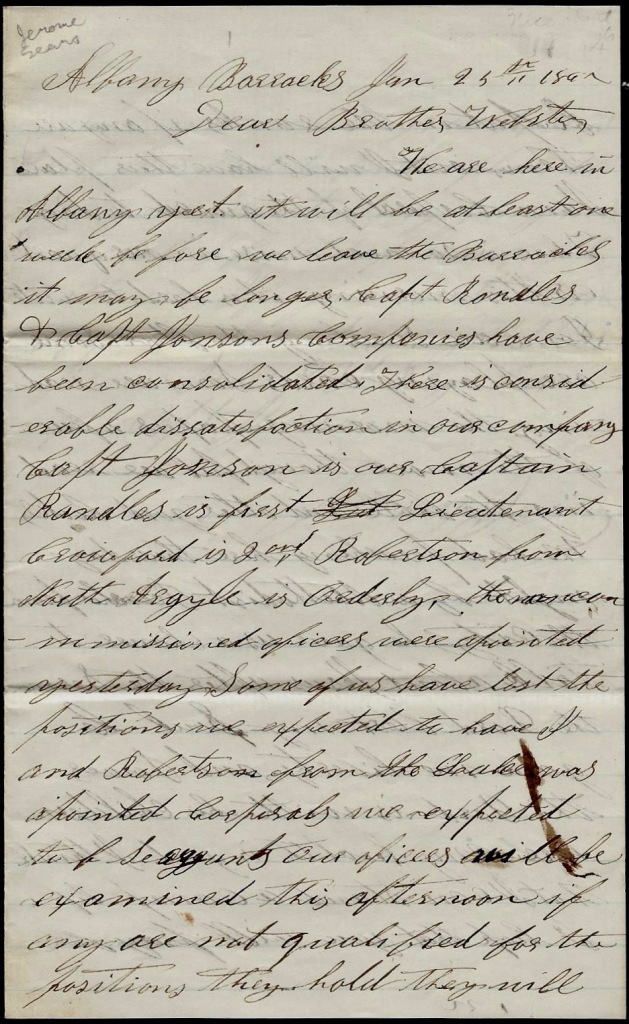
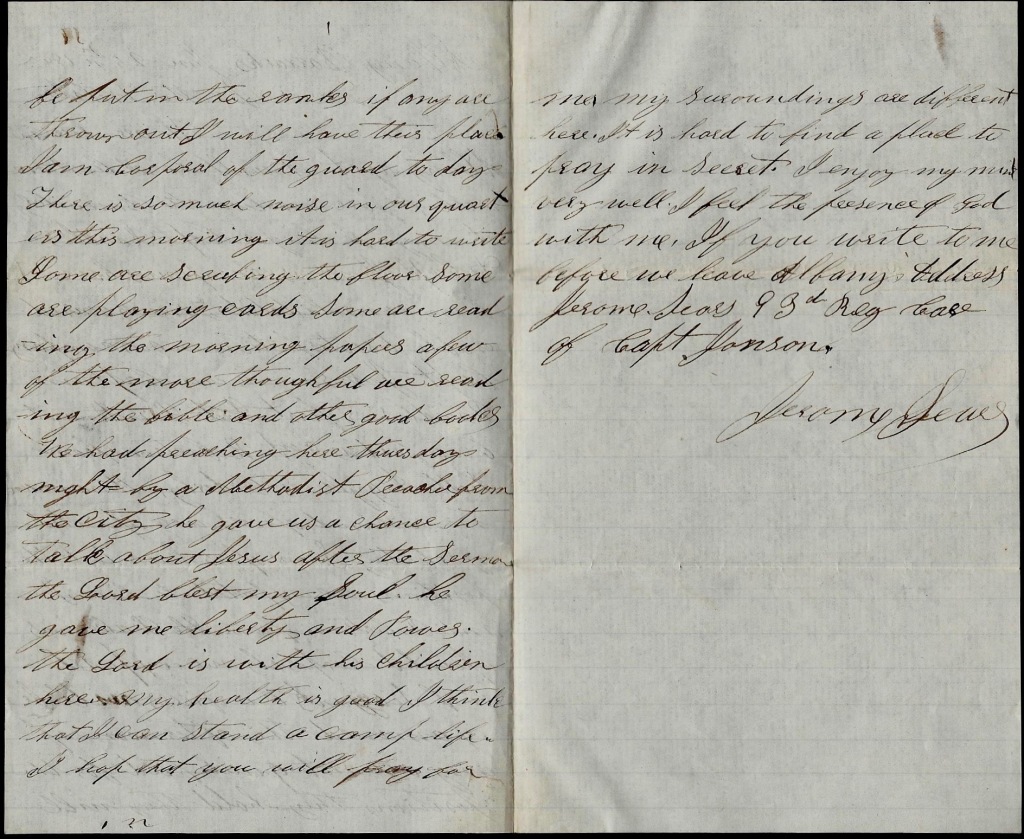

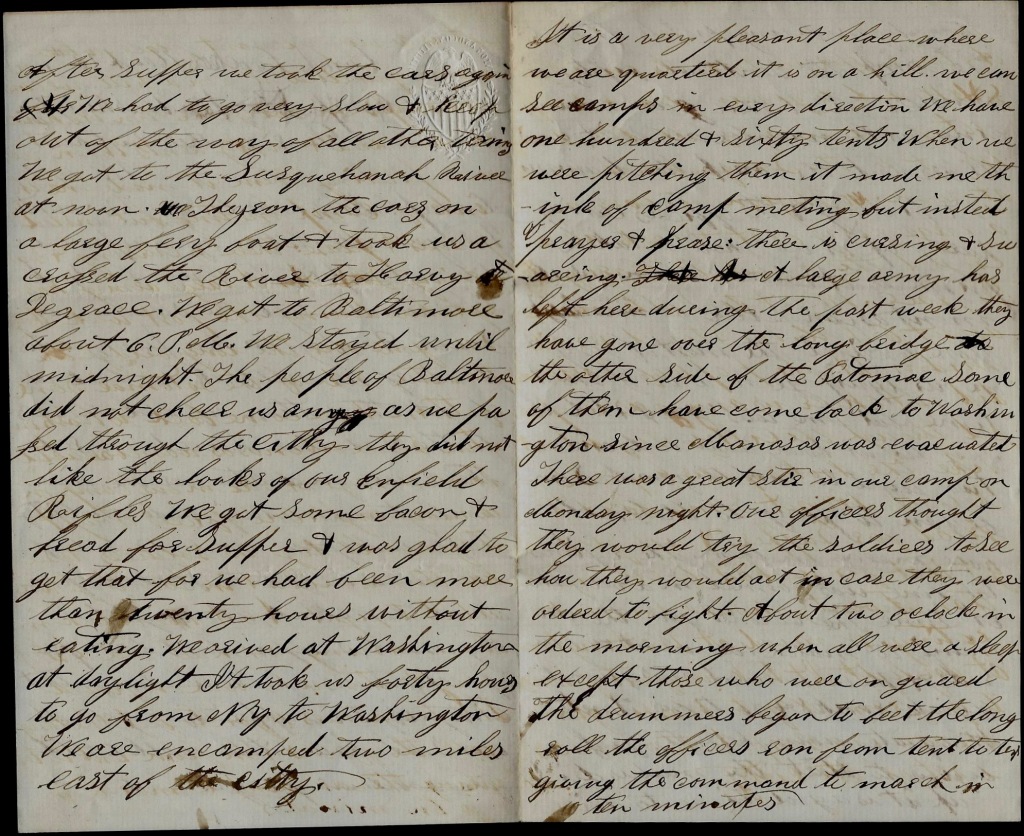
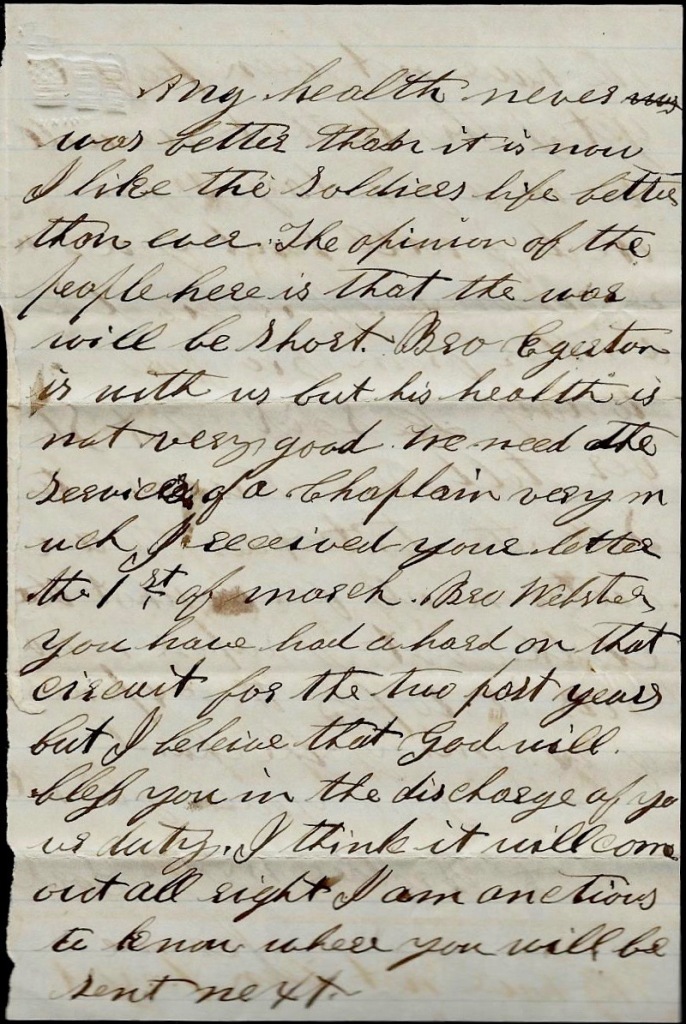


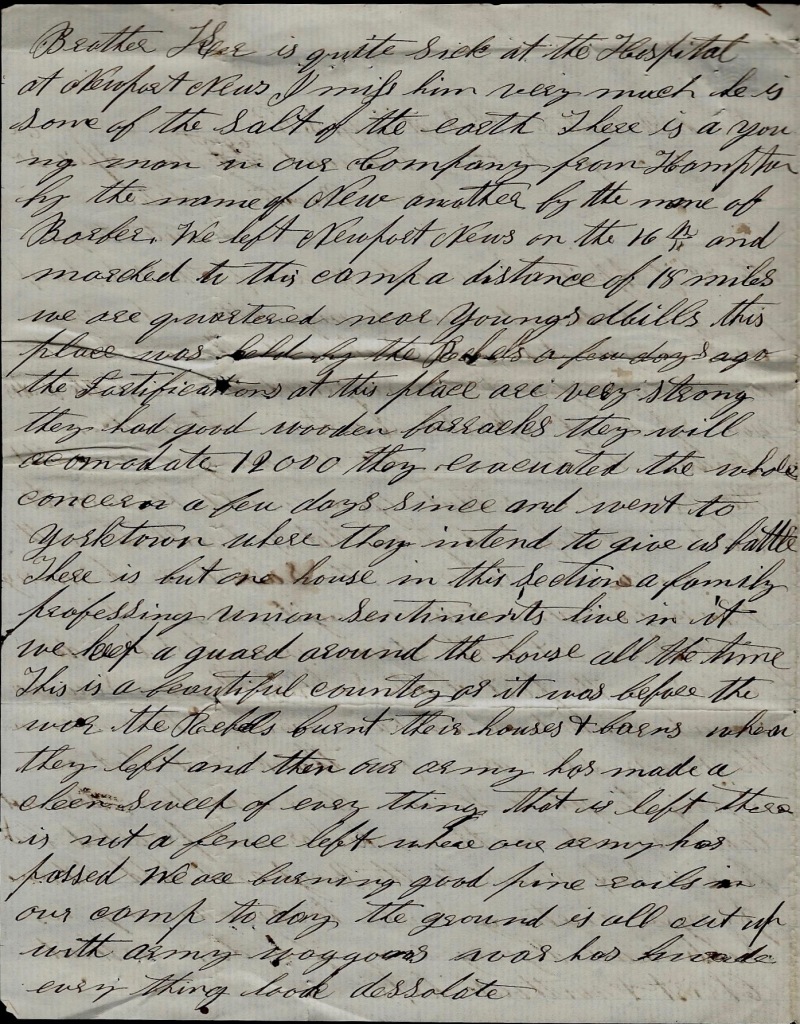


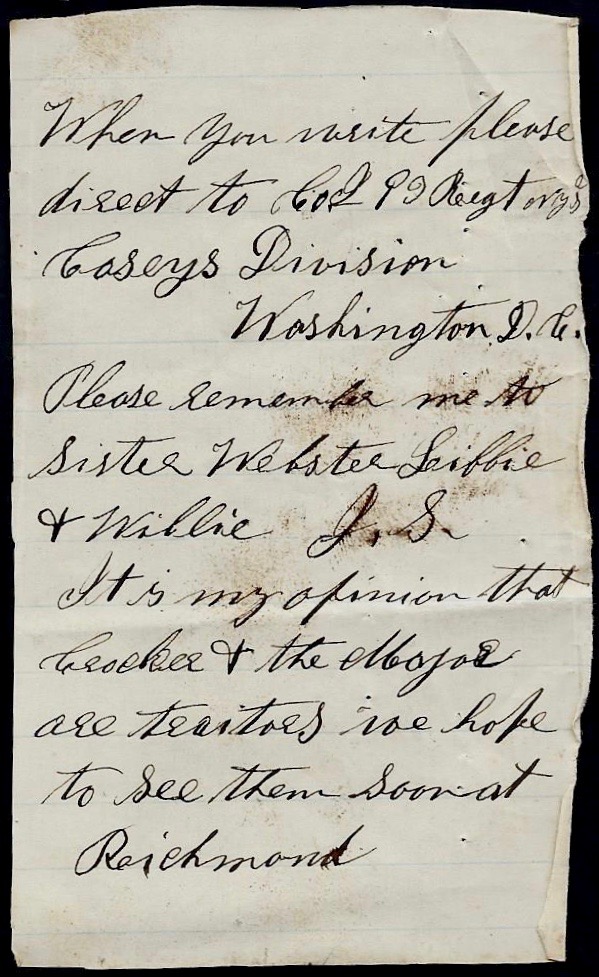



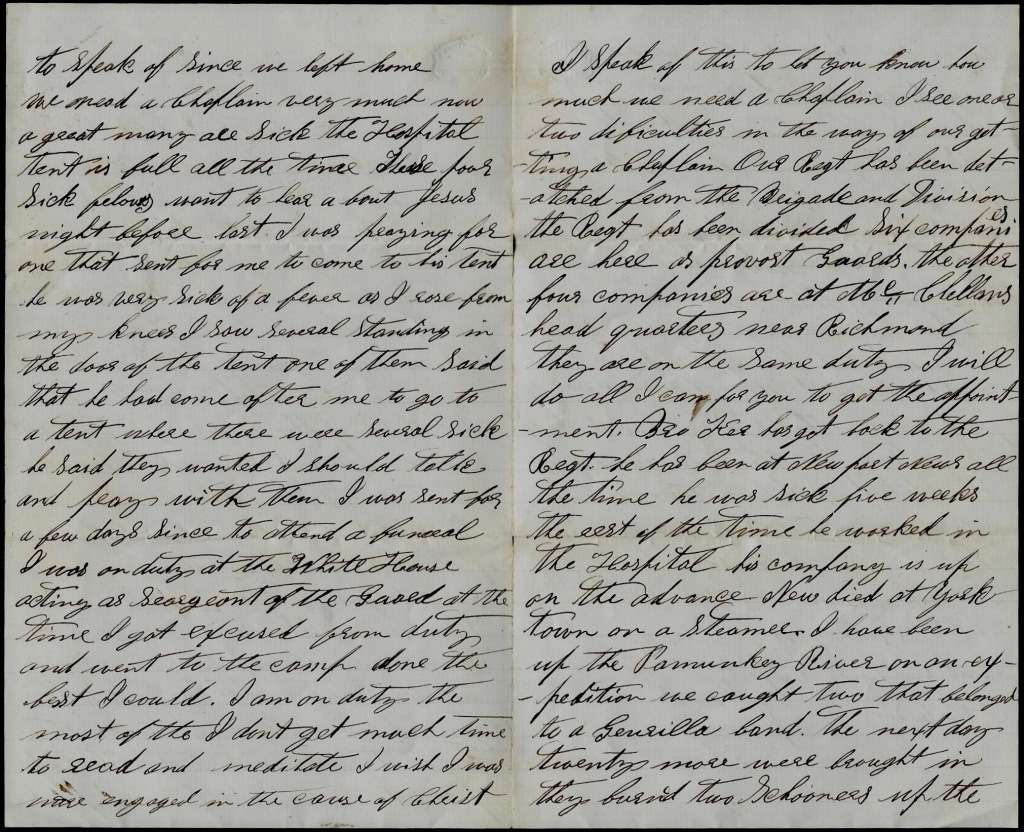

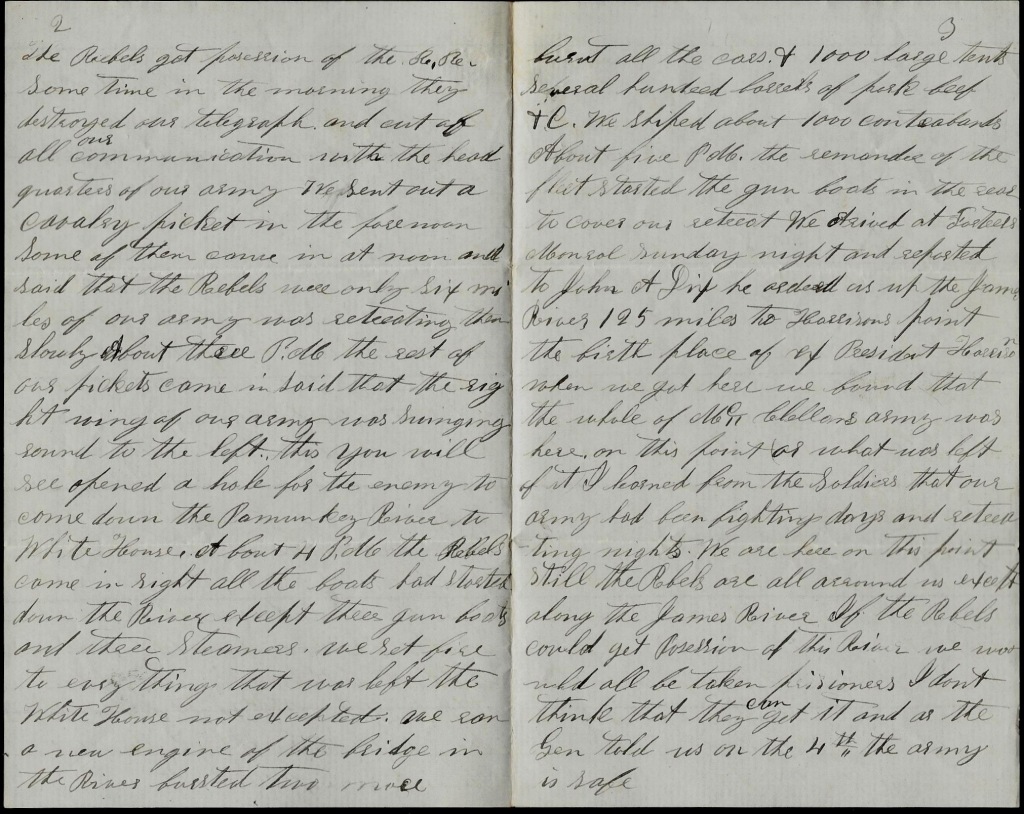
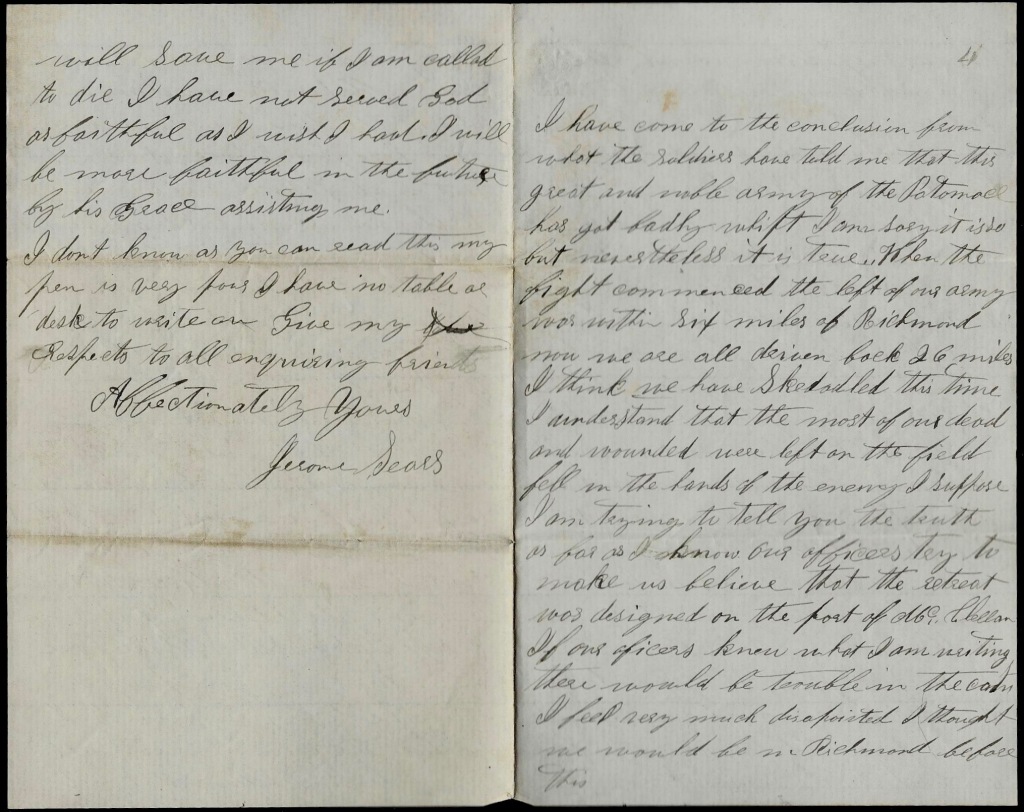

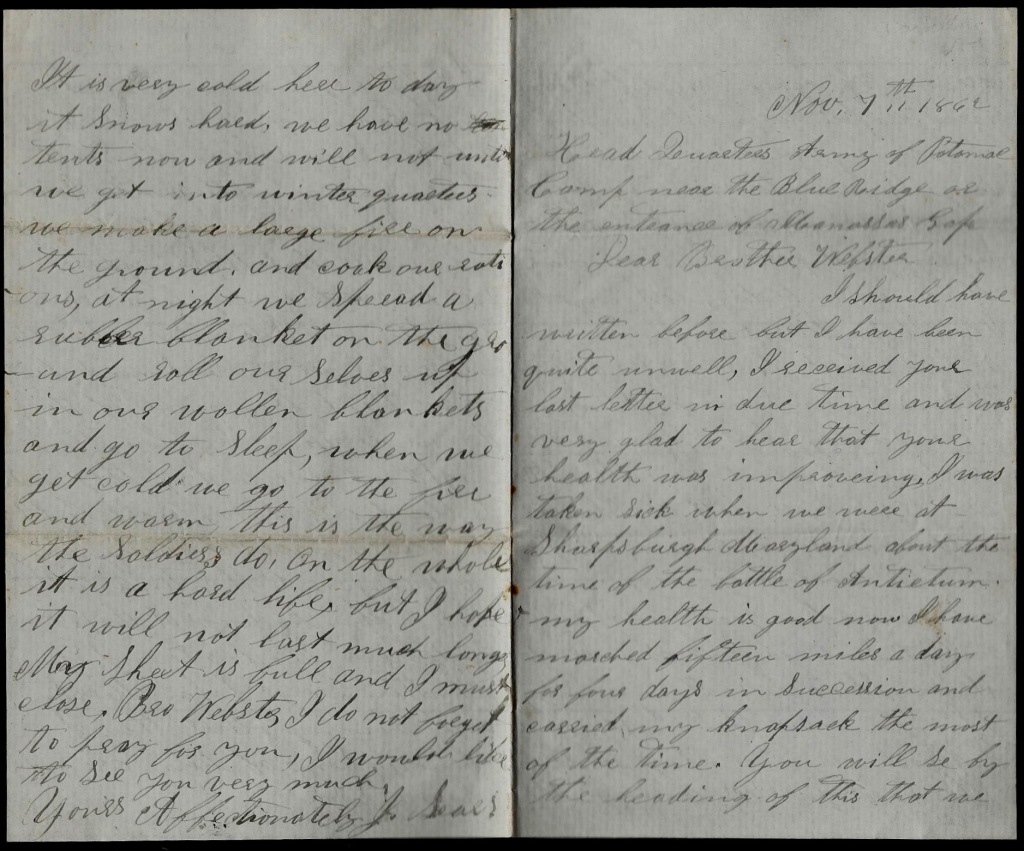




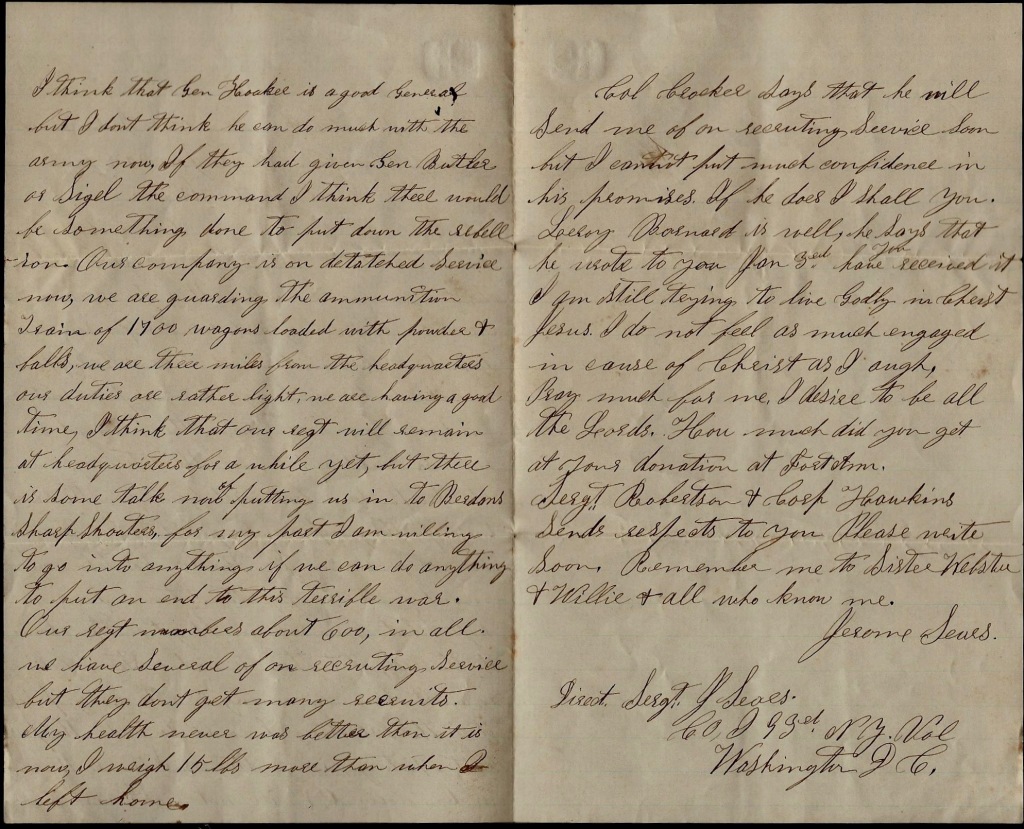

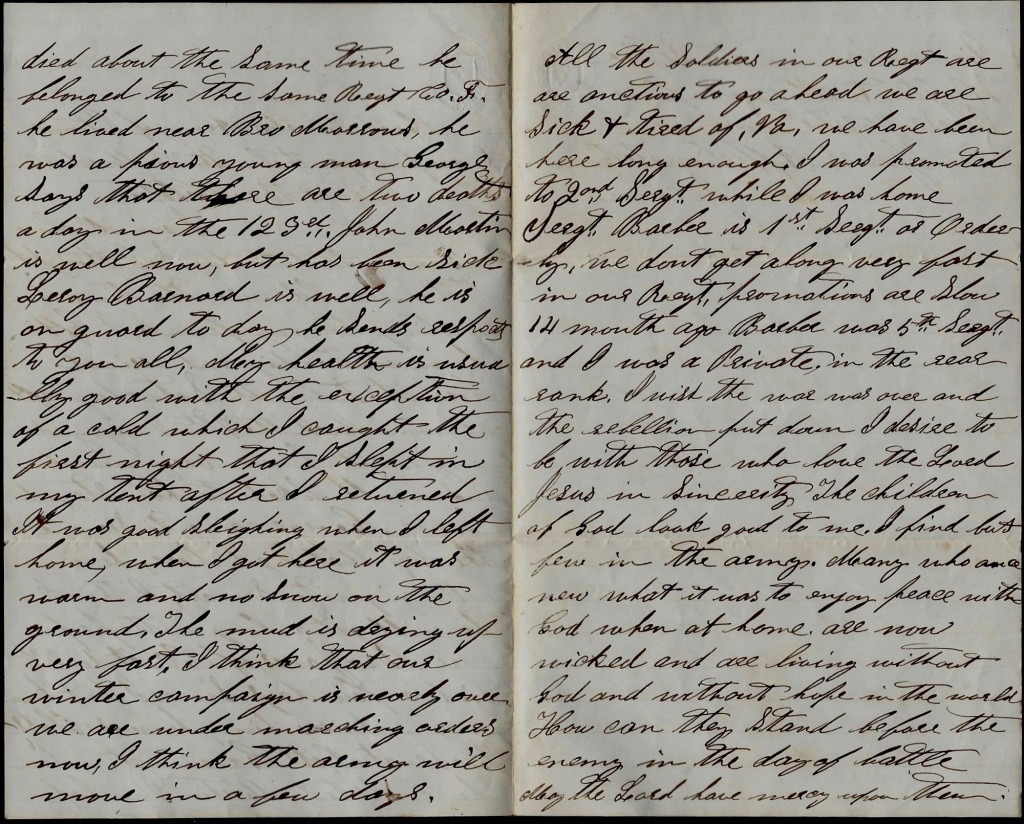


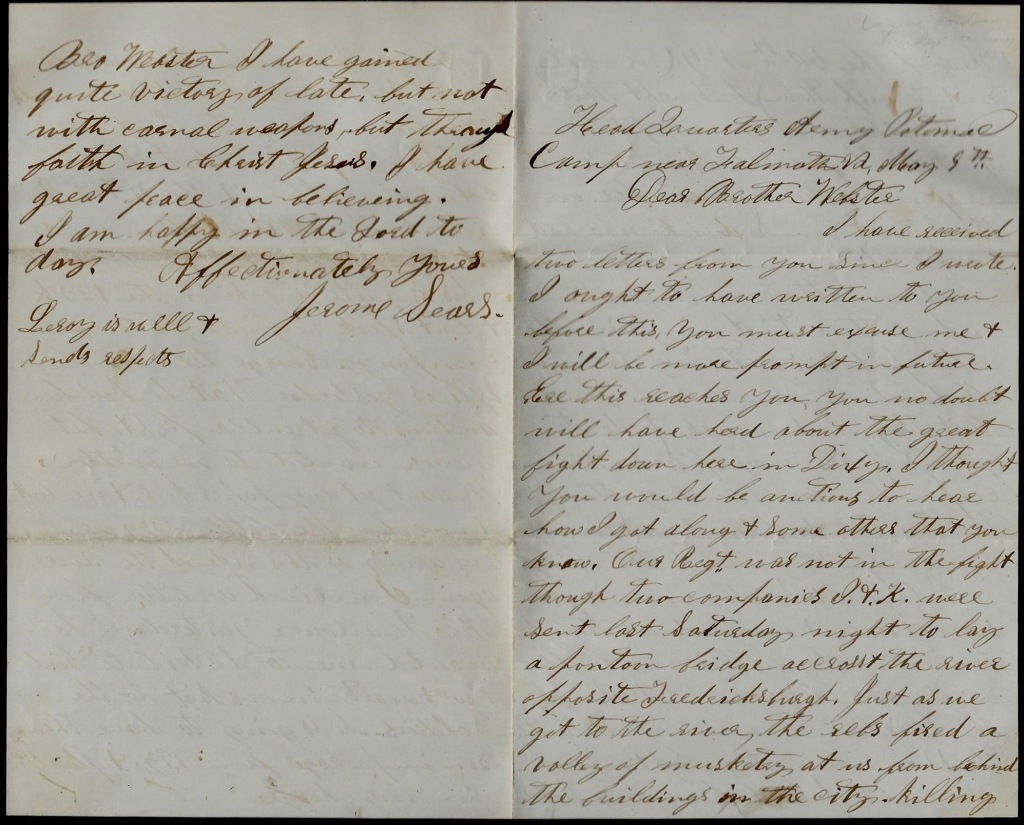







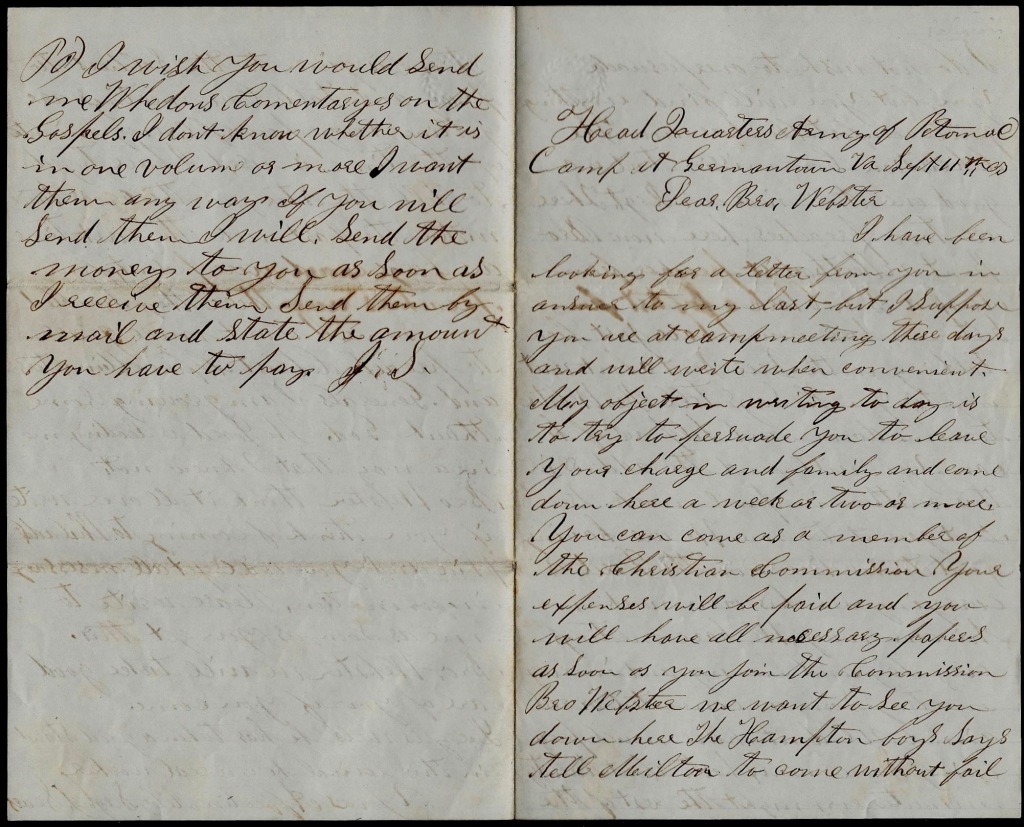

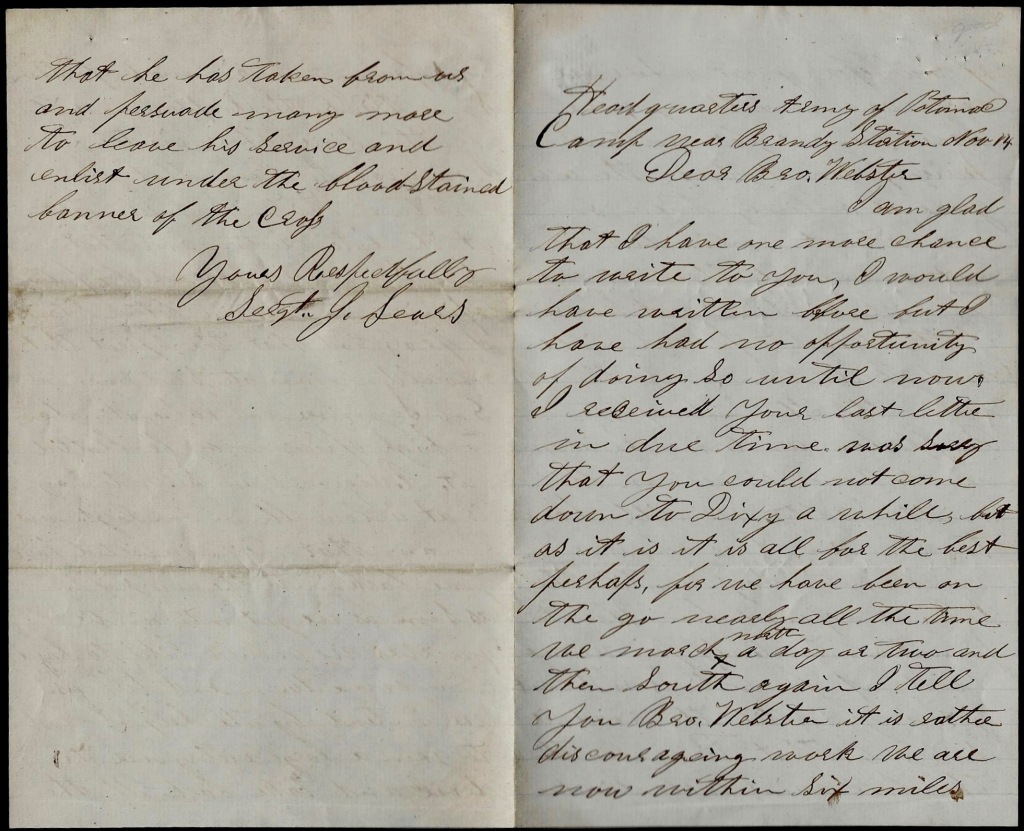
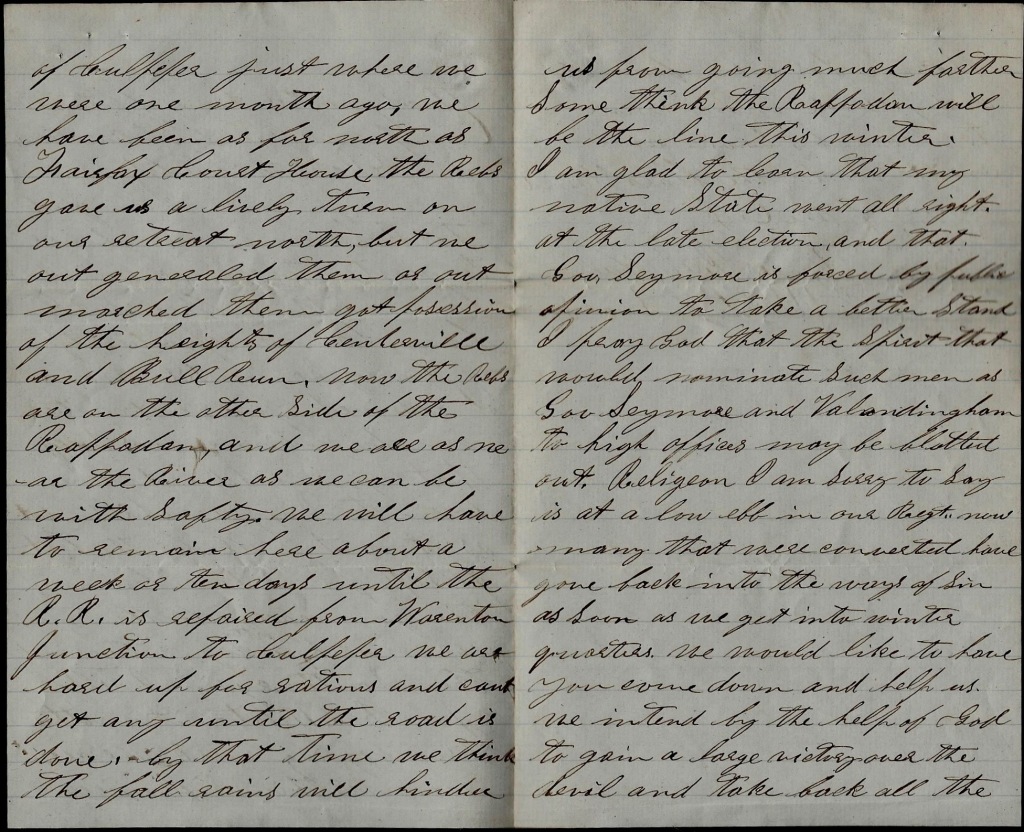

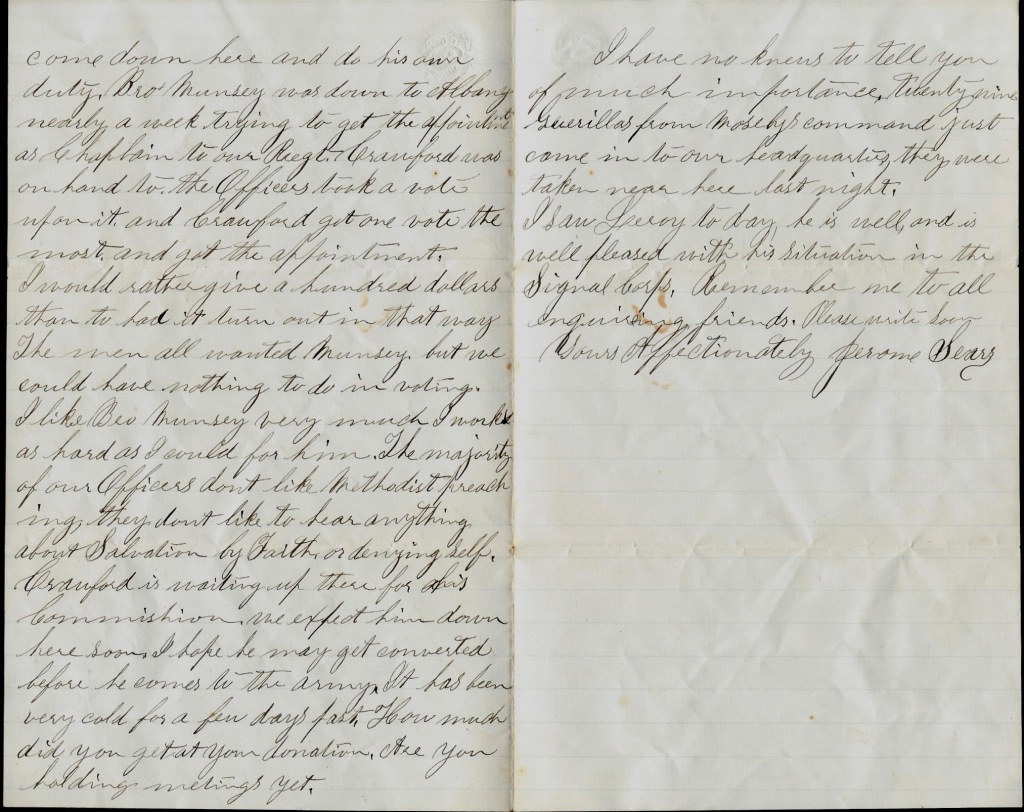
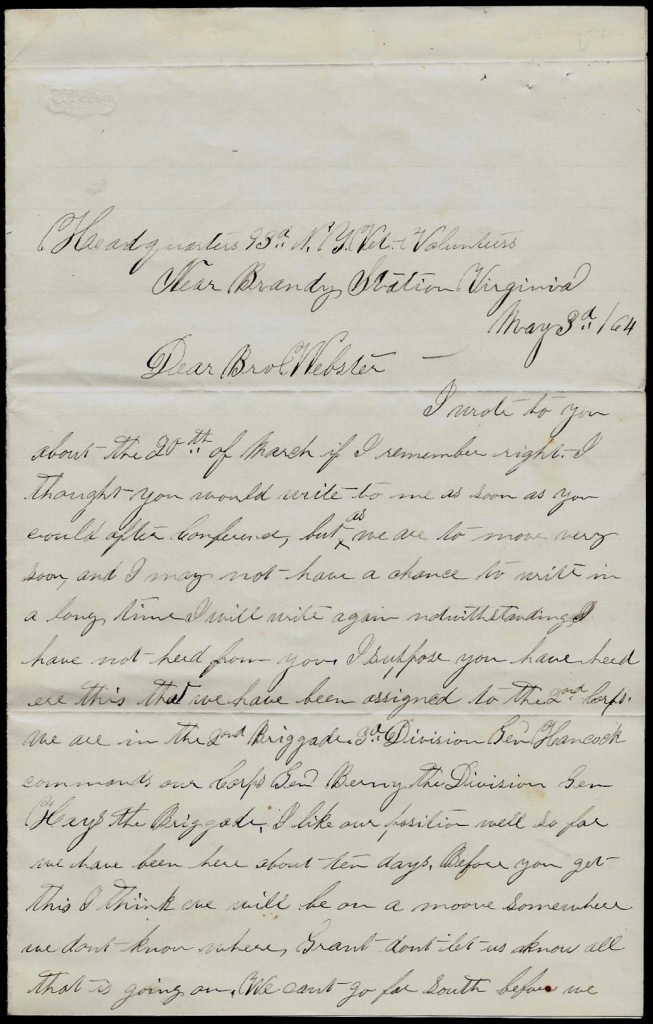
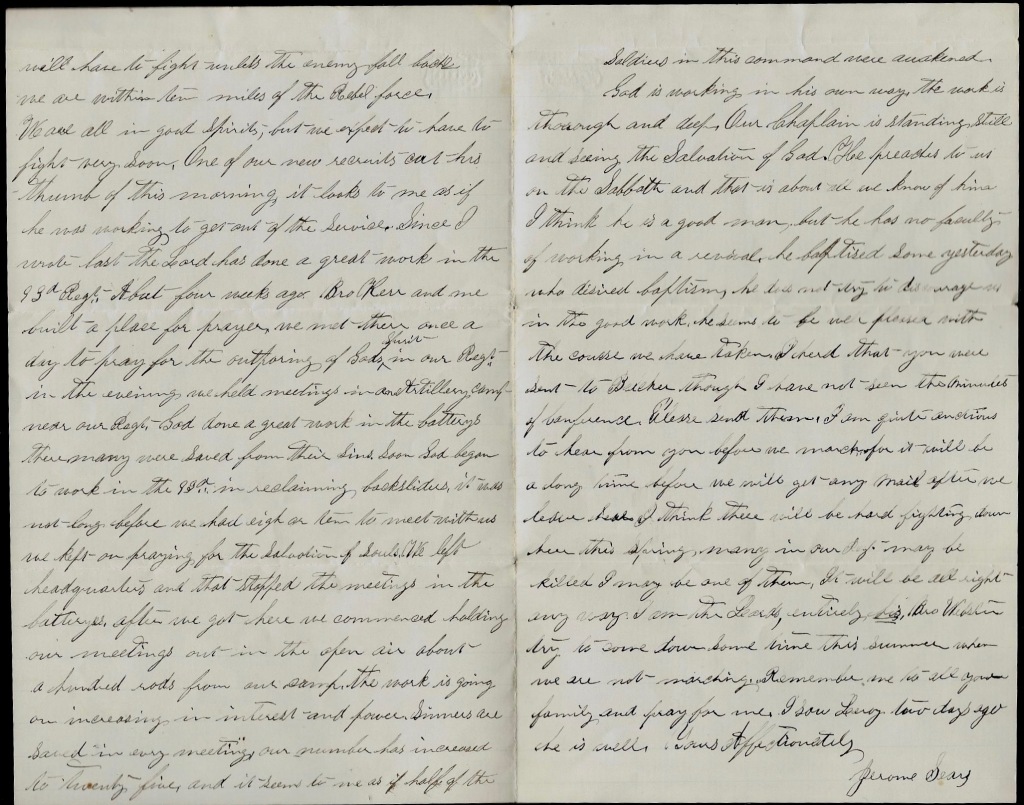





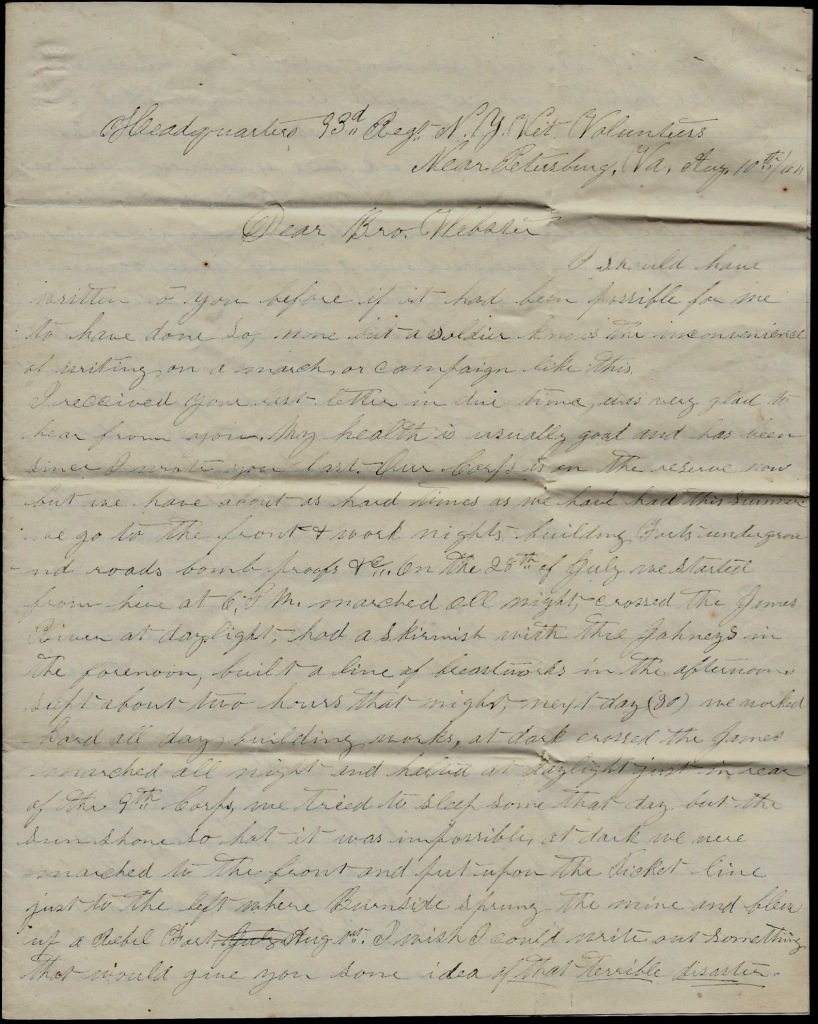
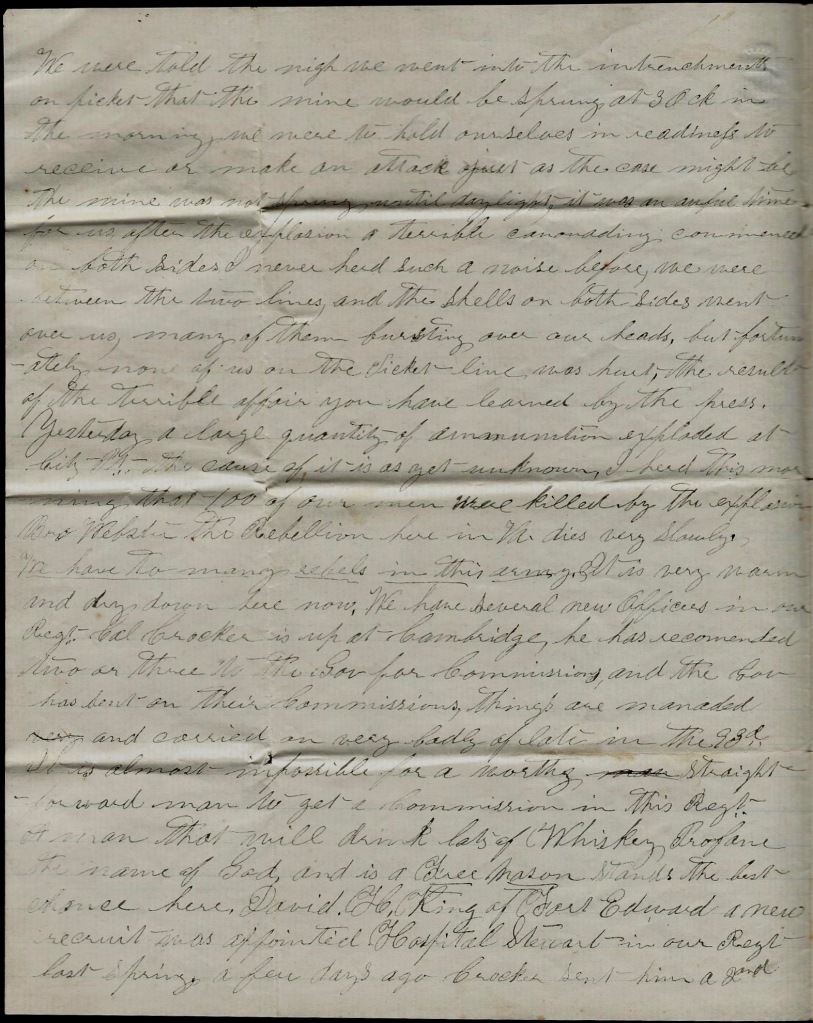
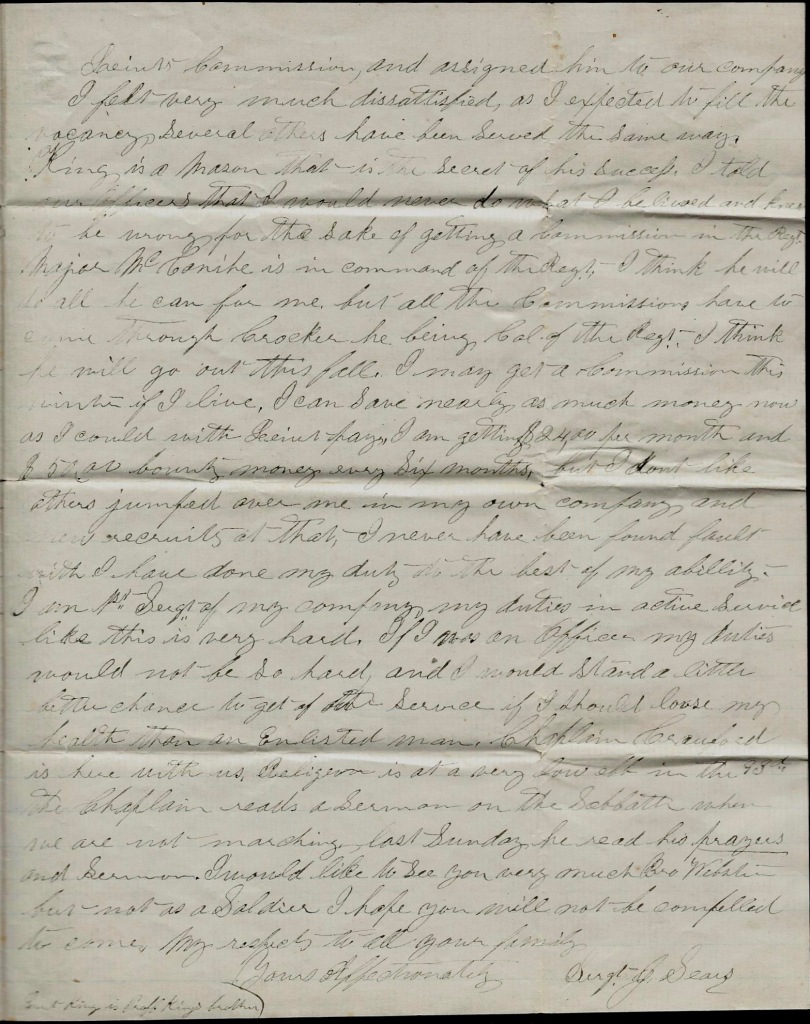
Such a great faith in this young man in some of the worst circumstances. Exemplary for us all morally. So many valuable details of movements of the war included in simple letters to his pastor. Special thanks for photo of the 93rd just before battle of Antietam. It’s gripping to scan the faces up close.
LikeLike